Reddit Profile: /u/_metaBot
GMBinder: Metabot on GMB
Discord: metaBot#7435 on DoMt
Compendiums: Slimes, Spells, Story Mechanics, Monks
Misc: Monk Adventure, Warlock Tweaks,
Stealth Rules
Fun: Goat Background, Hag Items, Mechs
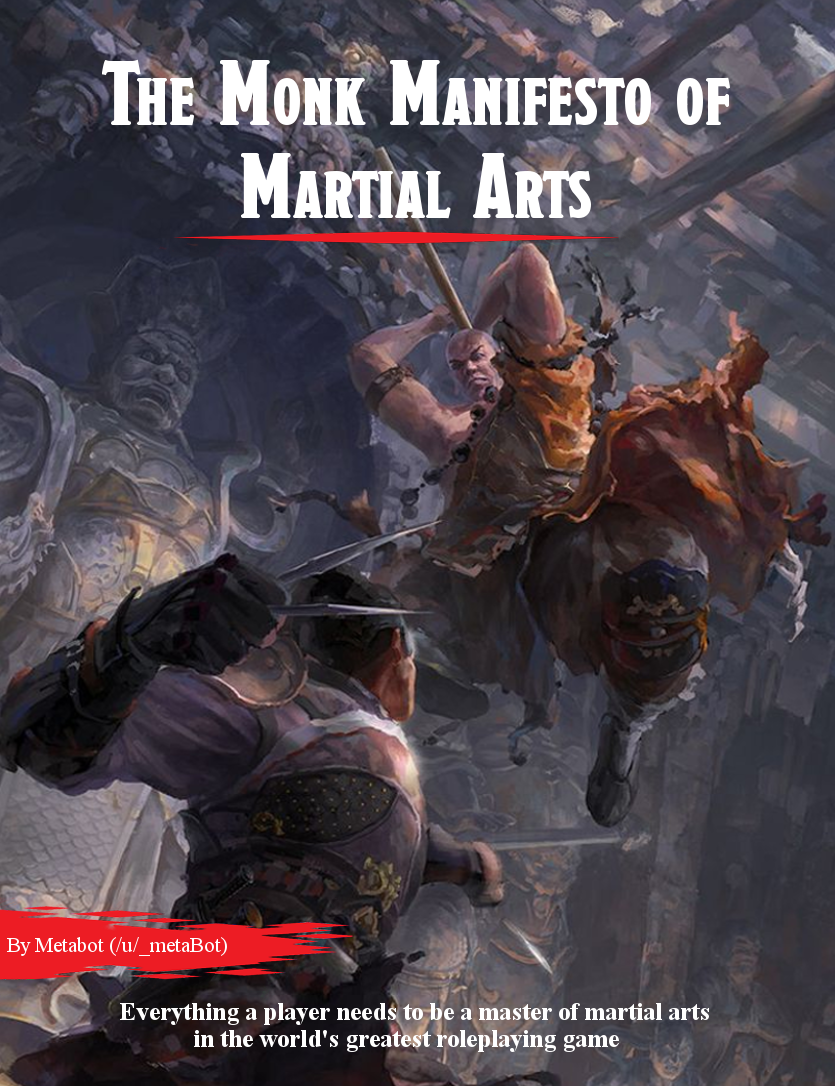
Table of contents
| # | Monk Title | Date | Description |
|---|---|---|---|
| 1 | Way of the Closed Circle | 9/07/2017 | A Grappling monk based off Aikido with powerful throws |
| 2 | Way of the Brawler | 9/08/2017 | An improvised weapon monk, based of Jackie Chan and action comedy |
| 3 | Way of the Planar Jouster | 9/08/2017 | Psionic monk that projects force out of his blows and walks through the air |
| 4 | Way of the Blazing Cinders | 9/09/2017 | An aggressive fire taekwondo monk with sweep attacks that spread fire |
| 5 | Way of the Winding Path | 9/09/2017 | Pinball monk based on Daoism and Yip Man. Bounce off walls! |
| 6 | Way of the Bo | 9/10/2017 | A monk that wields a long-staffed weapon - "spin" mechanic on misses. |
| 7 | Way of the Five Forms | 9/11/2017 | Monk based on the five traditional Chinese animal forms ( and dragon). |
| 8 | Way of the Constellations | 9/11/2017 | Monk based on somatic casting, like in Naruto or FMA. |
| 9 | Way of the Flowing Water | 9/12/2017 | Monk based on battle field control, displacements and slows. |
| 10 | Way of the Sure Strike | 9/12/2017 | One shot one kill monk, based on Japanese archery. |
| 11 | Way of the Runemarked | 9/14/2017 | Spellcasting Tattooed monk. With the abilities of a Monster . |
| 12 | Way of the Gunkata | 9/15/2017 | Martial close-ranged gun -- ahem ranged weapon wielder. |
| 13 | Way of the Drifter | 9/15/2017 | Combo monk based on Wushu. Fights using "Sequences." |
| 14 | Way of the Earthen Anchor | 9/16/2017 | Strength monk based on earth element. |
| 15 | Way of the Fabled Facade | 9/16/2017 | Masked monk/ skill monk based on Japanese Legends. |
| 16 | Way of the Iron Reaper | 9/17/2017 | Blade summoning monk based on the metal element. |
| 17 | Way of the Ninja | 9/17/2017 | Vault warrior. Can lay traps, throw bombs, and summon magical artifacts. |
| 18 | Way of the Ancient Oak | 9/18/2017 | Monk based on the wood element. |
| 19 | Way of the Brute | 9/18/2017 | Strength monk based around Kickboxing. |
| 20 | Way of the Mantra | 9/19/2017 | Support monk based on provoking opportunity attacks |
| 21 | Way of the Golden Needle | 9/19/2017 | Support monk that heals with Chakra and Acupuncture |
| 22 | Way of the Drunken Master | 9/20/2017 | The Drunkest Drunk Monk - can stumble around the battlefield |
Recommended Additions:
The following options are meant to be played alongside these options: (notably excluding some UA monks)
- From official sources: Open Palm (PHB), Shadow (PHB), Long death (SCAG), Sun Soul (SCAG)
- From other's homebrew: Four elements redone (by IrishBandit and SpiketailDrake), Sprouting Chaos monk (by Jonoman3000)
The monks presented above, alongside the compendium, are an unabridged collection that span monk tropes but do not overlap. Each of the monks should have their own niche, both in terms of mechanics and flavor while being comparable in terms of balance.
Part of the goal is to have options that can spam the feasible realm of what players want to play. If you think you know of, or have created a high-quality monk subclasses, you can send a PM to _metabot on reddit to get it considered for recommended additions.
Reflavoring
Way of the Planar Jouster and Way of the Winding path can be easily reflavored as Air and Electricity elemental monks.
But I want to play now!
If you read these monks and though "Damn... I want to do this NOW" that’s what this last section is for. I'm giving you material for an adaptable combat and stealth oriented one-shot "The Temple Assault" that you can run. "The Temple Assault" is designed for a party of 4 level six monks from this compendium only. Pick a monk subclass from the compendium and get going!
Credits
- Coauthors: SacredWKnight, Genuinebeliever, QalarValar.
- Special thanks to the Discord of Many things for help and guidance. In particular: Bagel, Wick, JLUnit, Emma, Layhnet, Groggen, Nasa, Joji, Sgtbriar, LGH, Moradin, Caim and many many more. Playtested by Bagel, Ludume, Dpadgamer, Bazaarine.
Way of the Closed Circle
Monks of the Closed Circle are known to be stubborn and resolute- not because they are unmoving in their ways, but because they throw their enemies off balance, and use a technique that uses an enemy’s strength against them.
Destabilizing Strike
Starting when you choose this tradition at 3rd level, you can destabilize enemies when you deal damage to a creature with one of the attacks granted by your Flurry of Blows. The creature has disadvantage on Strength and Dexterity checks until the end of their next turn. If the creature is moved against their will before the end of their next turn, they fall prone.
When you have an enemy grappled, you can expend some of your remaining movement and an action to throw an enemy horizontally a distance equal to half the movement expended. A thrown enemy stops when it collides with another creature at least are large as it, or impassible terrain, such as a wall. If a creature is thrown into an enemy creature, both take your Martial Arts die in bludgeoning damage.
Ebb and Flow
At 6th level, one must be exceptionally stable to successfully attack a Way of the Closed Circle. As reaction to when someone enters your reach, you can expend 1 ki point, and attempt to grapple them. If you are successful, you can immediately throw them 20 feet.
Add Yours to Mine
At 11th level, you can use an enemy's strength against them. Whenever you are in an ability contest involving Strength or Dexterity, you can use their strength modifier instead of your own.
Whenever a creature makes a melee attack against you and misses, you can move 5 feet without provoking opportunity attacks. This does not take a reaction, but this movement expends movement that you had remaining at the end of your turn. You cannot use this ability if you have no more movement remaining.
Dismembering Pin
At 17th level, you learn a secret technique that allows you to inflict excruciating damage on an individual that stays in your grapple. You can spend your action to go prone and incapacitate a target that is prone and grappled by you. The target is incapacitated until the grapple ends. You can have only one creature under the effect of this feature at a time.
On a following turn you can use your action on a creature incapacitated by this feature to attempt to dismember the target, who must make a dexterity saving throw. On a failure, the limb is damaged beyond use.

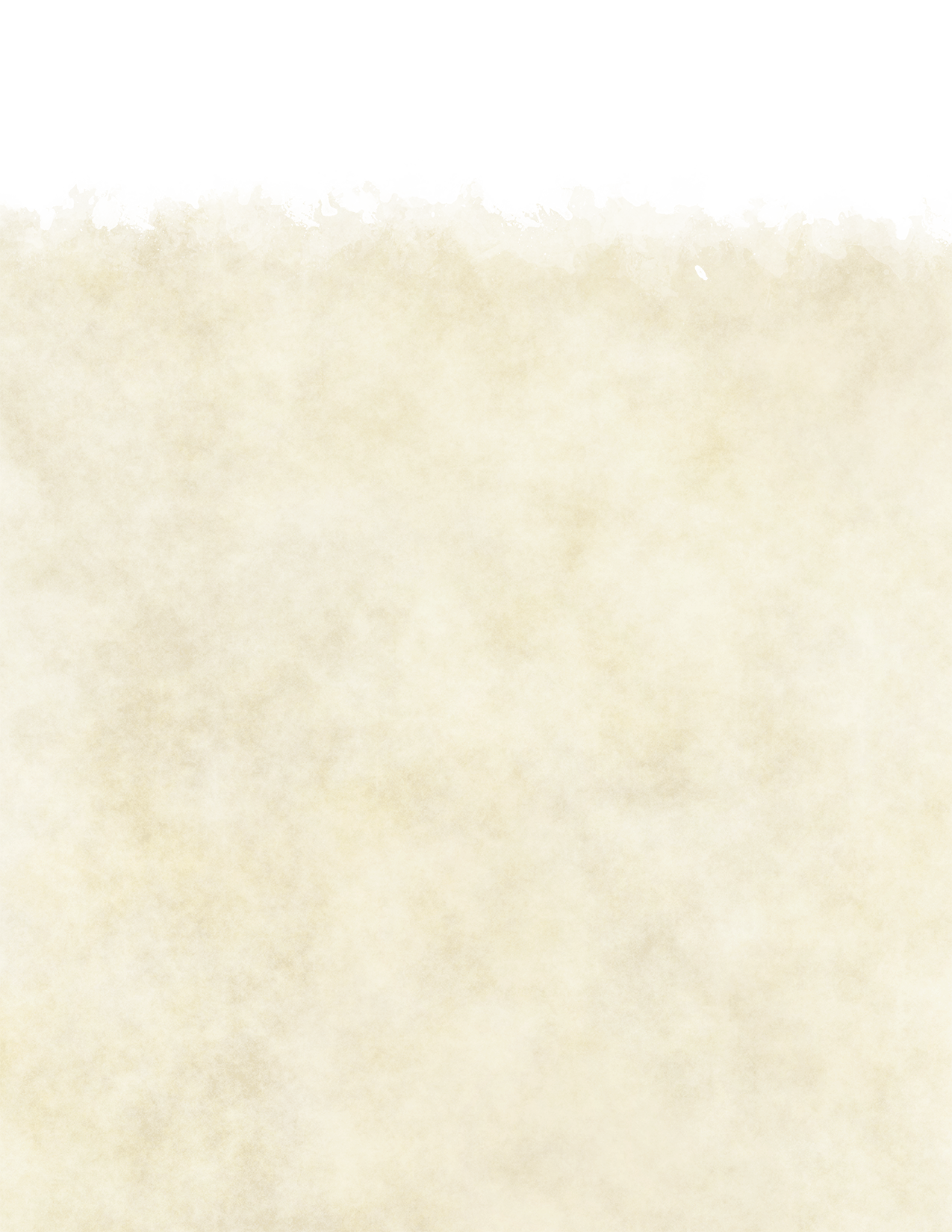
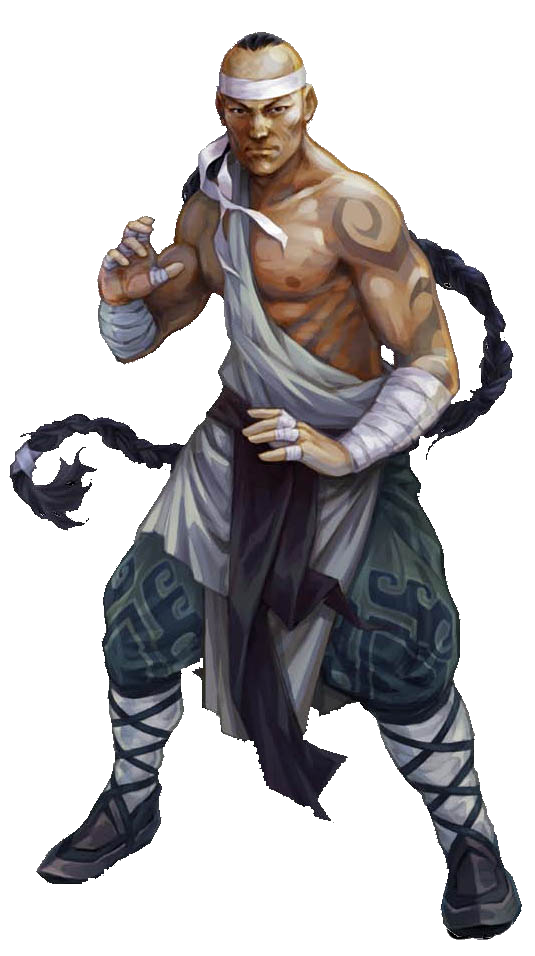
Way of the Brawler
Way of the Brawler monks have an informal name because they don't originate from an order or monastery. Usually friendly and jovial these monks make their way through life with little in the way of a plan - but succeed in their endeavors regardless.
Junkyard Fighter
At level three, you can fight well in any situation, using the environment to your advantage. You gain the following benefits:
- Improvised weapons, such as bottle or debris, are monk weapons for you. You can even use larger items such as tables or doors as improvised weapons, pushing them 10 feet as part of the attack and dealing your martial die in damage if the object would have ended in a creature's space.
- When you flurry, you can attack with a thrown weapon, even if you are not currently holding any weapons. You can pick up an improvised weapon within 5 feet of you as a part of the attack.
- You can choose for any attack granted by your flurry feature to push the target 5 feet back on a hit instead of doing damage.
This is Going to Hurt
At 6th level, you have resistance towards environmental damage. You can use a bonus action to gain temporary hit points equal to twice your monk level until the end of your next turn. You must finish a Short or Long Rest before you can use this bonus action again.
Knocking Heads
At 11th level, when you use your Attack Action to make an unarmed strike against two creatures within 5 feet of each other and successfully hit both creatures, they must each make a constitution saving throw or be stunned until the end of their next turn.
If you use forced movement to push one person into another, both take your martial die in damage, and must succeed on a dexterity saving throw or fall prone.
Blind Luck
At 17th level, you excel at being able to fight in conditions that would typically hinder normal combatants. If you have disadvantage on the attack roll of an unarmed strike, you can gain advantage on that attack roll.


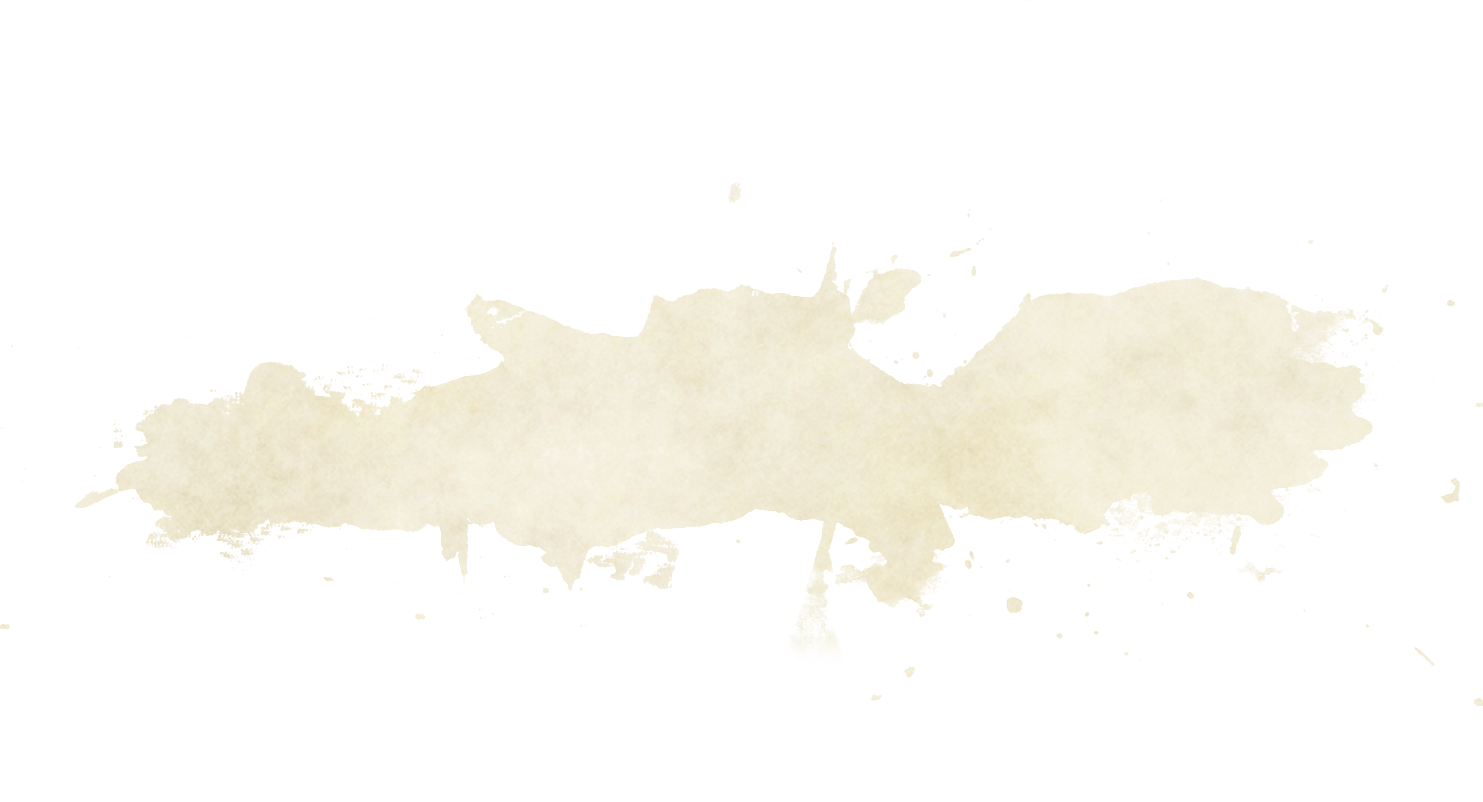





Way of the Planar Jouster
Monks of the Way of the Planar Jouster have an uncanny attunement with planes outside the prime material. Through strict training, they can project forces out of their bare hands, disappear briefly into the ethereal plane, and use a near-forbidden technique to dislocate an enemy’s soul into the Astral Plane.
Supernatural Flurry
Whenever you attack a target using your Flurry of Blows, you can disrupt the planar space around them. At the end of your turn, you can move the target up to 5 feet away for each attack granted by flurry you directed at them. If this movement would force the target to impact a stationary object, such as terrain, it takes 1d4 bludgeoning damage per 5 feet of forced movement remaining. Additionally, unarmed strikes on your turn have a reach of 10 feet. You have disadvantage on attacks against targets beyond 5 feet.
Juxtapose
At 6th level, you can thrust yourself into the Ethereal Plane at a moment's notice. When another creature hits you with a melee attack, you can use your reaction to vanish into the ethereal plane as if by the etherealness spell and make that attack miss. On the start of your next turn you appear within 10 feet of the space you vanished from. You must finish a short or long rest before you can use this feature again.
Additionally, any time a creature fails their saving throw against your Stunning Strike monk feature, you can choose for that creature to be instead under the effects of the banishment spell until the end of your next turn.
Ethereal Step
Beginning at 11th level, you can spend one ki point to project power from the many planes out of your feet. Until the end of your turn, you can climb through the air, if you move at least 5 feet horizontally for each 5 feet vertically.
When you are 10 feet above a medium sized creature you are considered out of their reach. When you are prone and 5 feet away from a creature, you can use a shove or your supernatural flurry to push people upwards.
Astral Rip
At 17th level, you gain the ability to forcibly push someone's spirit into the astral plane, disrupting their soul's connection with their body. When you hit a creature with an unarmed strike, you can spend 3 ki points to partially dislodge their spirit, which lasts for many days equal to your monk level. This effect is harmless until you take an action to make the special melee attack. The creature must make a wisdom saving throw. If it fails, their spirit is ripped from their body and propelled into the astral plane resulting in the creature dropping to 0 hit points. On a success, the creature is blinded and incapacitated until the end of its turn.
You can have only one creature under the effect of this feature at a time. You can choose to end the effect harmlessly without using an action.


Way of the Blazing Cinders
Monks of the Blazing Cinders are strong and always burning with passion-- for they have learned to control and create fire and heat from the using passion and to some extent, hate, as the fuel.
Paths of Fire
Starting when you choose this tradition at 3rd level, you learned how to utilize sweeping kicks to flare your aggression at two targets in the same motion. When you hit on an unarmed strike granted by Martial Arts or Flurry of Blows, you can make an additional attack on a different creature within your reach. The second attack doesn't add your ability modifier to the damage unless that modifier is negative.
You also learn the produce flame and control flame cantrips.
Scorching Heart
At 6th level, you gain resistance against fire damage. You also gain an additional option that can replace your stunning strike: the target must make a Constitution save against your ki save DC. On a failed save, it becomes Immolated, taking 2d6 fire damage at the end of each of its turns until it or a creature within 5 feet of it uses its action to put it out. The fire damage increases with your martial die (2d6 becomes 2d8 at 11th level, and so on). When you use your Paths of Fire feature and hit with both attacks, if the first target was Immolated, the second target must succeed on the Constitution save or also be Immolated.
Combustion and Destruction
Beginning at 11th level, you have mastered the destructive power of the passion from within. You gain the following ability:
- Combustion. As an action, you may spend 2 ki points and choose one creature or object you can see within 10 feet of you. The target takes 4d10 fire damage and Immolated. On a successful Constitution saving throw, the target takes half as much damage and doesn’t ignite. If a creature was already ignited, it gains vulnerability to fire damage after it takes the damage while it is Immolated.
- Destruction. As an action, you may spend 2 ki points and create a fiery explosion at a point you can see within 120 feet of you. Each creature in a 20-foot radius sphere centered on that point must make a Constitution saving throw, taking 4d6 fire damage and being knocked prone on a failed save, or half as much damage on a successful one. If the explosion is centered on an Immolated creature, any creature that fails their save also become Immolated.
Soul of the Pyre
At 17th level, you perfected the balance of passion and gain the ability to turn yourself into a being of immense power. As a bonus action, you may spend 3 ki points and enter the State of Fire which grants you the following abilities for one minute:
- You gain fly speed equal to your movement speed.
- You shine 60-feet of bright light another 60-feet of dim light.
- Any hostile creature of your choice that ends their turn next to you must make a constitution saving throw or take 2d6 fire damage.
- Your unarmed strikes and attacks from Paths of Fire do fire damage, and have a reach of 20 feet.
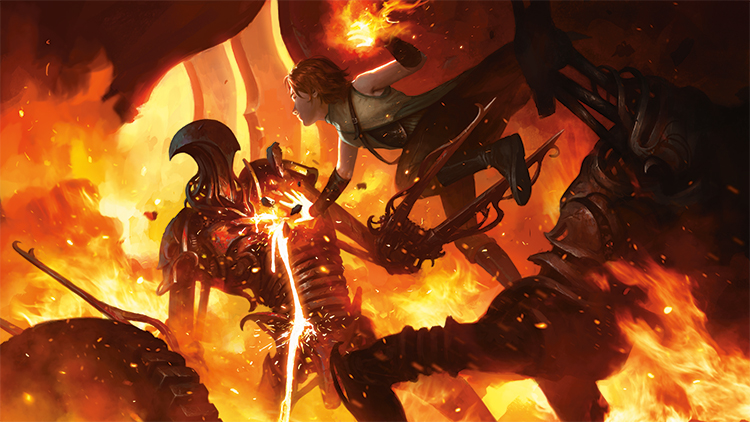

Way of the Winding Path
Monks of the Way of the Winding Path are humble, astute, and stoic-- for they have learned to recognize the flow of causality that governs the mortal planes. Their fluid fighting form has been known to disorient and disrupt enemy ranks.
Sanctity of Movement
Starting when you choose this tradition at 3rd level, you can spend a bonus action and 1 ki point to enter a stance that heightens your spirit's ability to align with the perpetual flow of the prime material planes. Until you end the stance you can only move in a straight line, changing directions only if you are next to an impassable terrain such as a wall. You can only make one attack per 5 feet of movement. While in this stance you gain the following effects:
- You ignore all magical effects that would affect your speed.
- Opportunity attacks towards you are at disadvantage.
- You deal 2 additional damage to creatures that were out of your reach at the start of your turn.
In addition, if you had moved at least half your movement in this stance you can expend your remaining movement and an action to make a special unarmed melee attack. This attack deals your martial die in bludgeoning damage for each 10 feet of movement expended and pushes the target 5 feet back for each 10 feet of movement expended.
Synchronous Redirect
At 6th level, you gain the ability to mix your offensive and defensive capabilities. As a reaction, right before a melee attack is made by you or targeted at you, gain advantage on the next attack towards the target and disadvantage on the next attack from that target. You must finish a short or long rest before you can use this feature again.
Cloud Step
Beginning at 11th level, for an action, you can let go your earthly tethers and enter a special meditation that lighten your body and mind. You're under the effects of the levitate spell which lasts a minute, does not require concentration, and allows for lateral movement as if you were on the ground. You must finish a long rest before you can use this feature again.
Singular Strike
At 17th level, you learn a deadly technique where you focus your attack and momentum into a singular point. When you hit a creature with the special melee attack granted by your sanctity of movement feature, you can spend 3 ki points to enhance that attack. A creature must make a dexterity saving throw. If it fails, the energy of your strike eviscerates their body and they drop to 0 hit points. If it succeeds, the creature takes 10d10 force damage. Either way, you appear up to 30 feet on the opposite side of the enemy after your attack.
If the target is an nonmagical object or a structure, it takes the maximum amount of force damage, and you make a 5-foot hole in the object.
Alternate rules:
- Replace: "Until you end the stance you can only move in a straight line, and..." with: "The stance lasts until you change direction by more than 45 degrees while not next impassable terrain such as a wall."
- You can allow players to change direction while in the stance when next to enemies that are at least as large as they are, possibly for an acrobatics check.
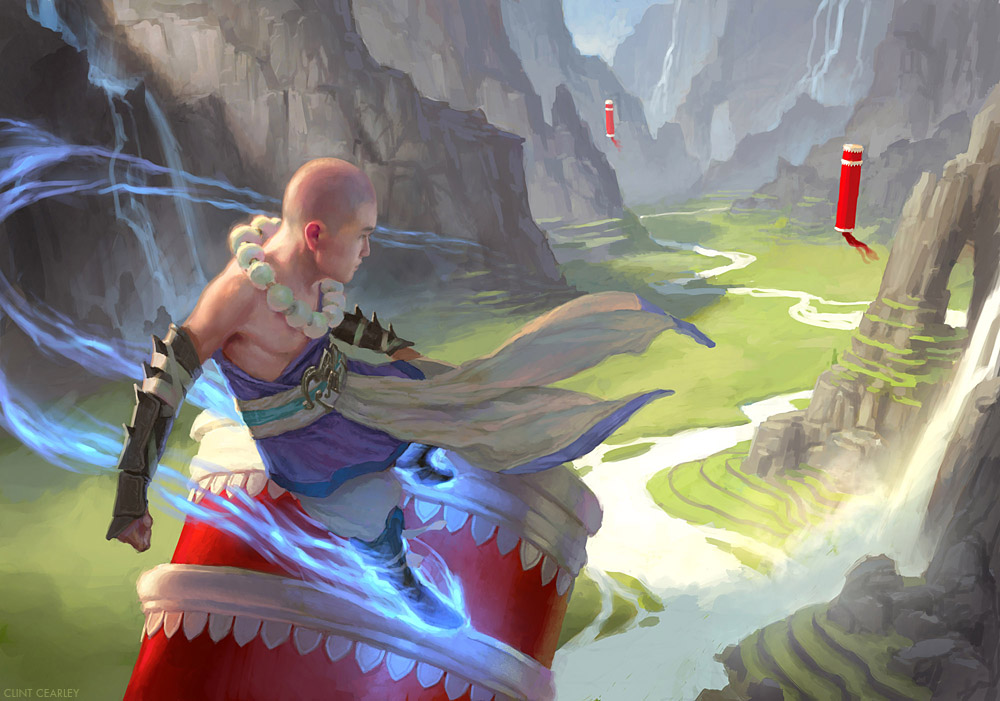

Way of the Bo
Monks of the Bo are well known, not for the expertise in which they wield their weapon of choice, but rather the innate grace and fluidity of their movements. In the chaos of battle, a Way of the Bo monk strides confidentially into danger, making minute adjustments to their stance and Bo to deflect projectiles and blows. They can use the momentum of their strikes that miss to empower other strikes.
Bo Spin
You gain proficiency in Bos. While you are holding your Bo, you gain a special melee attack to Spin your Bo, which does damage equal to your Martial Arts die on a hit and has a reach of 5 feet. You do not add your ability modifier to the damage of this attack, unless it is negative.
If you miss on this attack, you have Momentum, and the next attack with your Bo that hits deals additional damage equal to your Martial Arts die.
While wielding your Bo, you can Spin your Bo once as a bonus action, or twice if you also spend one ki point. You can Spin your Bo even when you don't have a valid target, and it counts as a miss.
Spin Deflect
If you have Momentum, when another creature targets you with a melee weapon attack, you can use a reaction to increase your AC by 5. You lose all your Momentum and cannot use this feature until you finish a short or long rest.
Untouchable Grace
At level 11 you can enter a stance where you make slight adjustments to your stance to avoid all but the keenest attacks. Unless you are surprised, each time you roll initiative you are under the effects of the blur spell, which does not require concentration and ends when you first take damage.
Swirling Dervish
At level 17 you can accelerate your Bo at an insane pace. When you use your Flurry of Blows, you can spin your Bo three additional times (up to a total of five attacks), provided that each Flurry of Blows attack isn't targeted at a creature you have already attacked this turn.
Alternative Rules:
Replace the second paragraph of Bo Spin with:
"If you miss, you gain one Momentum point, which can be expended when you use an Action to make a melee weapon attack with your Bo to add an additional Martial Arts die to the damage roll. You can have a maximum of 3 Momentum points and maintaining momentum requires concentration."
Exotic Weapons
| Name | Cost | Damage | Weight | Properties |
|---|---|---|---|---|
| Bo | 10gp | 1d10 piercing, bludgeoning or slashing | 3 lb. | Reach, two-handed, finesse |


Way of the Five Forms
Way of the Five Form monks derive their strengths from the 5 classic animal forms - and their ability to switch between them. Using nature as their teacher, they can quickly switch between the stance that suits them best at any time. Their fluidity lets them shrug off attacks, and they eventually gain access to the fabled dragon stance.
Animal Stances
At third level, you gain access to the five traditional animal forms. You can move to a form (no action required) at the start of your turn, which empowers an attack and has a passive benefit that lasts until the end of your next turn or until you move to a different form.
Monkey
- Passive: You have advantage on opportunity attacks.
- Active: You can use Dexterity (Acrobatics) instead of Strength (athletics) on your next grapple check.
Crane
- Passive: You don't provoke opportunity attacks.
- Active: You can use Dexterity (Acrobatics) instead of Strength (athletics) on your next skill check to Shove a creature.
Snake
- Passive: Attacks against you while prone aren't at advantage.
- Active: Immediately after you enter this form, you can stand up from prone without expending movement and your next attack has a reach of 10 feet and does additional piercing damage equal to your wisdom modifier.
Mantis
- Passive: Your unarmed melee attacks deal slashing damage and are no longer at disadvantage when prone.
- Active: Your next attack against a prone target deals additional damage equal to your martial arts die if it hits.
Tiger
- Passive: Your base movement speed increases by 10 feet and you no longer move at half your speed when moving with a grappled creature.
- Active: The first time you move at least 20 feet straight toward a creature and then hit it with an unarmed strike, that target must succeed on a Strength saving throw or be knocked prone.
Fluidity of Form
At level 6, your fluid adaptable fighting style throws people off. You gain temporary hit points equal to half your wisdom modifier rounded up (at least one) each time you change your stance.
Dragon Stance
At level 11 you gain access to the fabled dragon form. You can move to this form for one ki point, which lasts until the end of your next turn or you go into another form.
- Your unarmed attacks score a critical hit on a roll of 19 or 20.
- Whenever you hit a creature with one of the attacks granted by your Flurry of Blows, they are pushed up to 10 feet back.
- Whenever you reduce a creature to zero hit points all hostile creatures in a 20-foot cone in the direction of your attack must succeed on a wisdom saving throw or be frightened.
Signature Stance
At 17th level, choose one of the five traditional animal forms, which is now your signature stance. You gain the effects of that stance as if you were entering the stance at the start of every turn.


Way of the Constellations
Monks of the Constellations are unique in that they develop a variation of spellcasting that requires them to make contact with other people's ki lines and form complex patterns with their hands and bodies. While this type of spellcasting is a little less reliable than conventional spellcasting, Constellation monks can cast a near limitless number of spells as long as they manage their ki.
Gesture Casting
At 3rd level, you learn a special melee weapon attack, a Gesture, which is an unarmed strike that does 1d4 bludgeoning damage. You don't add your ability modifier to the damage of a Gesture, unless that modifier is negative.
After you attack with a Gesture twice, you can choose for your next Gesture before the end of your turn to Gesturecast a level one spell. For each additional Gesture you make before you Gesturecast you can increase the spell level by one. You don't need a target to make an attack with a gesture.
When you Gesturecast a spell, the spell can only affect the creature you hit with the unarmed strike. That creature has disadvantage on its first saving throw made against the spell.
Preparing and Casting Spells
You can only Gesturecast spells that come from the wizard spell list, and only if the spell requires the target of the spell to make a dexterity, strength or constitution saving throw. You prepare the list of wizard spells that are available for you to cast, choosing from the wizard spell list. When you do so, choose a number of wizard spells equal to your Wisdom modifier + half your monk level, rounded down (minimum of one spell). The Spells must be of a level for which you can Gesturecast: level 1 spells at the 3rd monk level, level 2 spells at the 5th monk level, level 3 spells at the 11th monk level, and level 4 spells at the 17th monk level.
You can change your list of prepared Spells when you finish a Short Rest. Preparing a new list of wizard Spells requires time spent enhancing the ki lines involved in casting the spell: at least 1 minute per Spell Level for each spell on your list.
Spellcasting Ability
Wisdom is your spellcasting ability for your Gesturecasted spells, since your power derives from the power of your ki. You use your wisdom whenever a spell refers to your spellcasting ability. In addition, you use your ki save DC as your saving throw DC for a Gesturecast spell.
Spellcasting Focus
Gesturecasting ignores material components but requires both hands free for somatic components. During your short and long rests, you must inhale burned incense in value equal to that of the material components of spells that consume material components--else lose your casting ability until you do.
Ki Projection
At level 6, you concentrate on ionizing the space in front of you with ki lines, increasing the range of your casting. Before you make the final Gesture to cast a spell, you can spend one additional ki to make a Gesturecasted area of effect spell target all creatures in area 15 feet long and 5 feet wide in a direction you choose.
Rites of the Gesticulating
At level 11, you learn one spell at 3rd level or lower from the wizard spell lists that you can cast as a ritual.
When you use your flurry of blows feature, you can use one additional ki and make three unarmed strikes as long as they are all gestures.
Unparalleled Agility
At level 17, you can add your proficiency bonus to any dexterity ability check you make that doesn't already include your proficiency bonus.
When you use your flurry of blows feature, you can use two additional ki and make four unarmed strikes as long as they are all gestures.


Way of the Rushing Tide
Monks of the Rushing Tide are flexible, sensible, and always flow with the world around them-- for they have learned to manifest and control water and ice that is powerful enough to both destroy and restore life.
Extreme Current
Starting when you choose this tradition at 3rd level, you've modeled your martial arts to have the fluidity and power of a rushing tide.
Once per turn (or twice, if you're using Flurry of Blows) you can move 5 feet immediately before or after you make an unarmed strike. If you hit, you move the target 10 feet in the same direction that you moved. If the creature is willing, you can forgo the unarmed strike and move the target 10 feet in the same direction that you moved.
You also learn the ray of frost and shape water cantrip.
Waterfall
At 6th level, you have figured out a way to use water to heal and give back power to the wounded ones. As a bonus action you can touch a creature (can be yourself) and surround the wounds that they have with a layer of healing water. The target heals for hitpoints equal to your monk level. You must finish a long rest before you can use this feature again.
You also gain resistance to cold damage.
Shattering Sea
Beginning at 11th level, you have mastered the destructive power of water. You gain the following ability:
- Freeze Snap. As an action, you may spend 1 ki to lower the temperature and chill a creature within 30 feet of you. The creature must succeed a constitution saving throw or be under the effects of the slow spell until the end of its next turn. Creature that are immune to cold damage are immune to this effect. The creature may make another constitution save at the end of its turn to end the effect. If you use this feature on a creature that is already under this effect, they are paralyzed until they make their save. If you use this feature on a creature that is already paralyzed by this feature, they are petrified.
- Control Water. As an action, you may spend 2 ki points to gain control of the water around you at an astonishing power. You cast the control water with a casting time of 1 minute.
Innate Prison
At 17th level, you perfected the flow of power from within, allowing you to fully manipulate the flow of power from another person. When you hit a creature with an unarmed strike, you can spend 3 ki points to you cast the spell imprisonment without consuming any material component.
You may only choose the following form of imprisonment: You choose to lock the creature's ki, sealing their soul in their body without giving it connection. The creature is incapacitated, and their speed is zero, as their body is perpetually tensed. The creature is aware of its surroundings but is effectively in a vegetative state.


Way of the Sure Strike
The Way of the Sure Strike monks are calm cool, and collected. They take their time, ensuring that their attacks never fail to pose a threat. Even when surrounded, they are known to beat off attackers with their weapon at hand. Anyone who has seen a Way of the Sure Strike mark an opponent knows to get down under cover – or experience judicious consequence.
Mark of Dread
At 3rd level, you gain proficiency in any one ranged weapon--which is your Kensai weapon.
When you could make an attack with the attack action, you can instead add a mark, which lasts until your next turn or until you hit the creature with an attack. For a bonus action, you can add one mark on someone who already has a mark, or two if you expend a ki point. You need to concentrate to maintain marks on a target as if concentrating on a spell. An attack on a marked creature does an additional martial die in damage for each mark.
Your marks are mystical in nature. If a creature starts its turn with a Mark it realizes it is being attacked, as an air of foreboding and uneasiness overwhelms it.
Weapon Bonding
At 6th level Your Kensai weapons count as magical for the purpose of overcoming Resistance and immunity to non-magical attacks and damage. You might extend hand crossbows' bolts to stab with, flip out a folding blade from your heavy crossbow, or use your bow as a club. You can apply your stunning strike feature on a ranged attack.
Your Kensai weapons are improvised melee monk weapons for you. Once per short rest until the end of your turn, your melee attacks with a monk weapon push creatures back 10 feet on a hit.
Careful Eyes
Starting at 11th level, you excel at picking out hidden enemies and other threats. You can take the Search action as a bonus action. You also gain proficiency in the Perception, Investigation, or Survival skill (choose one).
You can use a reaction to add an additional mark on an enemy at the end of their turn, if you have had line of sight on them for their entire turn.
In My Sights
At 17th level, you can use a reaction and 2 ki points to double the number of marks on an enemy at the end of their turn, if you have had line of sight on them for their entire turn.
Alternate rules:
Marks last until you next make an attack towards a creature. When you attack someone who is marked, you roll an additional attack roll as if you were making an attack for each mark, doing additional damage equal to your martial die plus dexterity modifier for each attack that hit. This damage occurs regardless of whether your first attack roll hit, and occurs simultaneously.
For example, a level 5 Way of the Archer monk with a +4 to Dexterity attacking a creature with three marks would roll 4 attack rolls total, and deal 1d6+4 damage per attack that hit. If the monk missed on his first two attacks but made the other two, he would deal 2d6+8 damage.
You only use one ammunition when you make this attack, and if the d20 roll for your first attack had been a 20 instead of a miss, you would roll all of the damage dice that come from marks twice as well, doing a total of 6d6+9 damage. On-attack effects like hunter's mark, hex, sharpshooter only apply once.

Way of the Rune-marked (Spellcasting)
Not all monks can make the ranks of the Way of the Spell Infused. These monks are ones with innate magic, and in another life, could have been sorcerers in their own right. They seal their powers through arcane sigils and use their own bodies as the templates in which to cast spells. As they grow stronger, they are more able to loosen the dams holding back their energy, which explodes outwards with incredible force.
Ki Palm Sigil
At 3rd level, you inscribe a runic tattoo into your each of your palms, amplifying your innate ki lines. Choose two cantrips from the following list that you feel most center around the motif of your tattoos: Acid Splash, Chill Touch, Fire Bolt, Guidance, Poison Spray, Produce Flame, Ray of Frost, Sacred Flame, Shocking Grasp, Thorn Whip, and True Strike. You use your tattoo as the material component for the cantrip if it requires one.
As a bonus action on your turn, you can clap your hands together and activate your sigils. The next two unarmed strikes you make can be replaced with casting a cantrip you've learned from this feature. If you do so, you can add your martial arts die to the damage dealt by this cantrip.
The cantrip is cast as if the caster is a spellcaster of a level equal to half your monk level.
Spell Tattoos
At 6th level, you inscribe tattoos into your body, and gain spells that correspond to the tattoo's motif. You can cast each spell using a tattoo only once per long rest, spending 2 ki points to cast the spell as an action and 3 to cast it as a bonus action.
| Motif | Spells |
|---|---|
| Spider | Melf's acid arrow, Web, Spider climb |
| Eye | Blindness/Deafness, find traps, See invisibility |
| Book | Comprehend language, Tongues, Hex |
| Night | Thunderwave, Moonbeam, Detect Good and Evil |
| Compass | Locate object, Knock, Guiding bolt |
| Heart | Calm emotion, Enthrall, Enlarge |
| Ring | Warding bond, Sending, Zone of Truth |
Ki Discharge
At 11th level, you can use an action and 1 ki point to exert you ki out in front of you. Choose an area of effect from the table below.
Each creature in the area of effect must make a Dexterity saving throw. A target takes three of your martial die in damage on a failed save, or half as much damage on a successful one.
Half of the damage is either bludgeoning, piercing, or slashing, depending on the area of effect you choose, and half is one of the damage type of one the cantrips. (You choose)
| Area of Effect | Damage type |
|---|---|
| 15-foot cone | Bludgeoning |
| 20-foot by 5-footline | Piercing |
| 10-foot radius, 5-foot-high Cylinder | Slashing |
You can also use an action to charge Ki Discharge. You concentrate as if concentrating on a spell. On the following turn when you spend an action to release the energy, Ki Discharge deals six of your martial die in damage.
Singular Expulsion
At 17th level, you can use your Ki discharge feature on a single target, doubling the damage die. You can choose to instead triple the damage and gain one level of exhaustion.
When you use your Ki Palm Sigil, you can have your cantrips target all targets in a 10 feet cone.


Way of the Gunkata
Unlike other monks who specialized in range weapons, who are aloof and prefer battle at a distance, monks of the way of gunkata excel in the chaos of battle. They use modified weapons and technique that allows them to load faster, shoot faster, at the expense of accuracy.
Gunkata
At 3rd level, you gain proficiency in crossbows --which are your Kensai weapons and count as monk weapons for you.
You do not need a free hand to load a one-handed weapon, and you can ignore the loading property on crossbows. You can reload all weapons you are holding if you expend 10 feet of movement, or 20 feet of movement if you are holding a heavy weapon.
When making an unarmed strike as a bonus action granted by Martial Arts or Flurry of Blows, you can instead make an attack with your Kensai weapon. When doing so:
- The damage dealt by the attack uses your Martial Arts die instead of its normal weapon damage
- Your normal and long range are reduced by 1/3.
- The attack does not trigger damaging effects that occur on a hit, such as hex or sneak attack.
Weapon Bonding
At 6h level Your Kensai weapons count as magical for the purpose of overcoming Resistance and immunity to nonmagical attacks and damage. You can apply your stunning strike feature on a ranged attack.
Your Kensai weapons are improvised melee monk weapons for you. You might extend hand crossbows' bolts to stab with, flip out a folding blade from your heavy crossbow, or use your bow as a club. A creature hit by a melee weapon attack using your Kensai weapon has disadvantage on opportunity attacks towards you until the start of your next turn.
Once per short rest, your melee attacks with your Kensai weapon are at advantage until the end of your turn.
Bullet Time
You can speed load your weapons through a fancy flourish, backflip, or dive. At 11th level you can reload any weapons you are holding by moving 5 feet and succeeding on a DC15 Dexterity (Acrobatics) check. If you succeed, this movement also does not provoke opportunity attacks.
You also learn how to enter a trance, preparing yourself to unleash yourself upon the enemy. While in this stance, you can still talk and move. If you stay in the trance for at least one minute, when you roll initiative, you can make a ranged weapon attack on every creature that stayed within 30 feet from you when you were in your trance.
Equilibrium
At 17th level, your first ranged attack and your first melee attack each turn deal additional damage equal to your dexterity modifier on a hit.
DM Note
- This homebrew is compatible with some but not all firearm homebrew. Firearms from the DMG work.
- Sharpshooter is an overloaded feat in general - but synergizes here a bit too well. The last bullet point in the 3rd level feature is intended not to allow the +10 damage from bonus action attacks as well.


Way of the Drifter (Combo/wushu monk)
The Drifter is a skirmishing fighter, willing to dash about while delivering unbroken sequences of attacks. The drifter excels dancing through a battlefield, stepping forward to use his momentum to deliver powerful blows.
Special Melee Attacks
When you choose this archetype at third level, you gain the ability to make a 2 Special melee attacks that make up your Sequences. If you’re able to make multiple attacks with the Attack action or make attacks with a bonus action, this attack replaces one of them.
- Culminating Strike (P) As part of this attack, you must spend 15 feet of movement.
- Celerity Step: (F) As part of this attack, you move 10 feet in a straight line. You don't add your ability modifier to the damage of the bonus attack, unless that modifier is negative. Alternatively, you can forgo the attack to gain 10 feet of movement.
After either of these special attacks hits you can choose to apply a Sequence effect depending on the permutation of fast and powerful attacks (see the table below). Attacks that hit qualify for sequences until the end of your turn, or until they are used in a sequence with the Sequence Breaker tag.
You learn 3 basic-tier sequences, and one moderate-tier sequence at the 3rd level. At 7th, 10th, and 15th level, you learn 2 more sequences, which must be from different tiers.
Flourish
Starting at 6th level, you have proficiency in the performance skill, and can make dexterity instead of charisma for performance ability checks.
You can expend one ki to make an attack count for the purposes of a sequence, even if it missed.
Conservation of Momentum
Beginning at 11th level, opportunity attacks provoked by Celerity Step movement are at disadvantage, and movement granted by Celerity Step ignores difficult terrain.
You also gain the ability to ignore other creature's effects that reduce your speed.
Final Form
Beginning at 17th level, you can enter a stance of extreme precision that helps the connection of your Sequence. Once per short rest you may spend a bonus action to enter the Final Form Sequence and the stance last for 1 minute. Once inside you gain the following features:
- Your last attack each turn is at advantage.
- Once per turn when you make an attack roll, you can gain a +10 bonus to the roll. You make this choice after you see the roll, but before the DM says whether the attack hits or misses.
- Creatures can't make attacks of opportunity against you.
Tips:
- Applying a Sequence Effect: For example, if you attack with Celerity strike (F), and hit and then attack with Culminating Strike (P) and hit, you can apply the Rising hope's effect (F P).
- Combining Sequence Effects Together: Continuing from the previous example, you can then make another Culminating strike and either use Singular Blow's effect (F P P), or Crunch (P P). If you use Crunch, the target has disadvantage on their strength saving throw.
- Sequence Beakers: If you attack and hit with a Culminating strike and use Rushing Jab's (P) effect, and then attack and hit with another Culminating strike, you cannot apply Crunch (P P).


Sequences
Basic Sequences
| Name | Trigger | Effect |
|---|---|---|
| Flourish | F F | You attack with a dazzling flourish. After your attack you can move 5 feet away from your target without provoking opportunity attacks. |
| Rising hope | F P | You swing upwards with your second attack, aiming to weaken your opponent. The target has disadvantage on one strength saving throw before the end of his next turn. |
| Tempered Slam | P F | A quick smack with your hilt pushes your enemy back. A huge or smaller must save on a dexterity saving throw or be pushed 10 feet back. |
| Crunch | P P | (Sequence Breaker) * Your powerful attacks press your advantage.* A huge or smaller creature must save on strength saving throw or be [knocked prone]. |
Moderate Sequences
| Name | Trigger | Effect |
|---|---|---|
| Rushing jab | P | (Sequence Breaker) * Your forward momentum carries you forward in a lethal jab.* Deal 1d8 additional damage if you move 10 feet directly at the enemy before your attack |
| Alpha Strike | F F F | (Sequence Breaker) * You jump from foe to foe, your weapon a spinning dervish.* Deal an additional 1d8 damage to your target for each different enemy hit in this sequence. |
| Singular blow | F P P | (Sequence Breaker) * You wind up for a terrible blow.* The target must make a constitution saving throw or all its attacks next turn are at disadvantage. |
| Hook Line | P F | If the target is huge or smaller, you are considered to be grappling the target until which ends if you move more than 5 feet. |
Advanced Sequences
| Name | Trigger | Effect |
|---|---|---|
| Grand Challenge | F F F F | You attack an enemy on all sides, exposing vulnerabilities. If all four attacks were made on the same target, that target must save on a dexterity saving throw or be paralyzed until the start of their turn. The target can repeat the saving throw to end the effect every time they take damage. |
| Cull the Weak | F P F P | Your last attack cleaves. You can make another attack roll on any enemies that are adjacent to both you and the target. |
| Calamitous Strike | F P P P | You rush forward, spinning around the enemy to end with an earthshattering strike. The target goes prone and must make a constitution saving throw or be incapacitated until the end of his next turn. |
| Intersect | P P F P | Your last attack catches the enemy off guard, allowing you access to his vitals. You appear on the opposite side of the enemy, out of his reach. The target must save on a dexterity saving throw or have disadvantage on constitution saving throws until the end of its next turn. |


Way of the Earthen Anchor
Way of the Earthen Anchor monks are strong and wise - but stubborn. They model their strength after their connection with the earth, which they find scared. A monk of this path deliberates before making their stand, but they are unparalleled in holding the line. Despite their stoicism, their connection with the earthen wellspring grants them incredible empathy, and they have been known to uproot themselves in times of dire need and sacrifice themselves for the greater good.
Dug in
At third level, you can dig your feet into the ground - granting unparalleled stability. For a bonus action you can enter a stance during which you gain the following benefits:
- Your speed is zero, you are immune to forced movement, and any critical hit against you becomes a normal hit.
- Your unarmed strikes deal double damage to structures.
- Before you make an unarmed strike, you can choose to take a penalty to the attack roll equal to your proficiency bonus. If the attack hits, you add a bonus to the attack’s damage equal to double your proficiency bonus.
Runic armor
At third level, you can utilize your monk training to use a special armor made from ki-projected and enhanced stone. Those who wear this armor can still benefit from monk features such as Martial Arts, as the armor interfaces with ki. You can fashion this armor with an hour of meditation and light activity as long as you have access to stone. Its worthless otherwise as it is customary to bestow these armors for free to newly adventuring monk.
You can create a set of Runic Armor, that has an AC of up to 20. However, you only benefit from Runic armor if you are a monk and the AC of the armor is equal to 10 + your strength modifier + your Wisdom modifier. Any more and that armor is either too heavy for you to use, or you don't have the skill to interface with its runic ki.
Great Wall
At level 6 your attunement to the ground improves. You can spend one ki to gain tremorsense to a distance equal to your unarmed movement bonus until the end of your turn. You can create a temporary wall 5 feet long and 5 feet wide as a reaction to be attacked. The triggering attack hits the wall, and if a target is in the wall's space, it is pushed backwards towards the nearest unoccupied space. The wall has twice your monk level in hitpoints, and an AC of 15. You must finish a Short or Long Rest before you can use this feature again.
Sculptor
Once you reach 11th level, your connection to the earth has allowed you to heighten your senses through meditation. You may spend 10 minute to meditate which allows you to enter a trance - you have tremorsense out to 600 feet and you may cast the move earth spell while mediating without material cost. You cannot see, are prone, and meditation ends if you move or attack. Once you have used this feature you must spend a long rest before you can use it again.
Martyr's Tomb
At 17th level, you can mitigate the harm done to your allies. If you are subject to an area of effect that requires a dexterity saving throw, such as a dragon's breath or a fireball spell, and you are within 30ft of the origin point, you can use your reaction and spend 3 ki points. If you do, you immediately move to the origin point of the effect and become the only target of the area effect. You make the saving throw with disadvantage, and fall prone.
Alternate rule
This subclass is meant to be played with strength as your primary stat. However, if you're playing a campaign that starts at second level or lower, you will find that your AC is significantly lower than it should be without a set of Runic Armor. If you're DM allows it, you can gain access to an inherited set of Runic armor before you learn how to make your own.


Way of the Fabled Facade
Masks of the Way of the Fabled Facade seek to replicate the oldest order of monks - Monks that appear in legends and fabled tales. They are able to channel their power with the help of a personal artifact, a simple mask, and use it to great effect. Advanced monks of this order develop a terrifying and mystical habit of appearing and disappearing at a whim.
Legendary Masks
At level three, you gain a mask that use to connect to legends past and channel their fabled abilities. You gain proficiency in the performance skill and the intimidation skill, and the benefits for the corresponding mask. Choose one mask:
- Hunter: a gleaming white oni mask - Gain proficiency in the Perception skill. You can use your bonus action to try to spot a weakness in a creature that you can see within 60 feet of you. Make a Wisdom (Perception) check contested by the target’s Dexterity (Stealth) check. If your check succeeds, you have advantage on attack rolls and ability checks against the target until the end of your next turn.
- Might: a snarling red mask - Gain proficiency in the Athletics skill. When a creature fails the skill contest to resist being shoved, they both get pushed back and fall prone. You can shove using a bonus action.
- Silence:, an expressionless mask with empty eyes- Gain proficiency in the Stealth skill, and can use a bonus action to hide. You remain hidden for 10 feet as long as you begin your movement hidden.
- Nightmare: a terrifying blue oni mask with horns - You have advantage on Intimidation checks. When you take the Attack action on your turn, you can replace one attack with an attempt to demoralize one humanoid you can see within 30 feet of you that can see and hear you. Make a Charisma (Intimidation) check contested by the target’s Wisdom (Insight) check. If your check succeeds, the target is frightened until the end of your next turn. If your check fails, the target can’t be frightened by you in this way for 1 hour.
- Vixen: a delightful masquerade fox mask - Gain proficiency in the Diplomacy skill. You can use a bonus action to beguile an enemy creature to dissuade it from attacking you. When you do, the target must make a Wisdom saving throw. If they fail, they are charmed by you until the start of your next turn, and will not take hostile actions against you, but may target your companions.
- Trickery: an ornate monkey mask - Gain proficiency in the Deception skill. When you take the Attack action on your turn, you can replace one attack with an attempt to deceive one humanoid you can see within 30 feet of you that can see and hear you. Make a Charisma (Deception) check contested by the target’s Wisdom (Insight) check. If your check succeeds, your movement doesn’t provoke opportunity attacks from the target and your attack rolls against it have advantage; both benefits last until the end of your next turn or until you use this ability on a different target. If your check fails, the target can’t be deceived by you in this way for 1 hour.
Once per short rest you can use your mask (no action required) to strengthen your connection with the legends. For one minute your proficiency bonus is doubled for any ability check you make that uses skills granted by this feature. You can use Wisdom as the ability score for the skill check instead of whatever it was.
Theatrical presence
At 6th level, when you use your mask to strengthen your connection to the legends, you can use a bonus action to cast a spell that lasts until the end of your next turn, which does not require concentration or expend a spell slot.
You also can cast Utility spell corresponding to your mask with the casting time of a minute. During this minute you can make a performance, and you can target any creature who watches your performance. Any creature who watches the performance also has disadvantage on the spell's save, if it has one.
| Mask | Don spell | Utility spell |
|---|---|---|
| Hunter | Hunter's mark | Detect thoughts |
| Might | Enlarge | Enhance ability |
| Silence | Invisibility | Blindness/deafness |
| Nightmare | Crown of madness | Fear |
| Vixen mask | Suggestion | Calm emotions |
| Trickery mask | Mirror image | Phantasmal force |
Face Swap
At 11th level, you learn the disguise self spell, and you learn how to make more use out of your mask:
- You can smear the blood or hair of a humanoid on your mask, which absorbs that humanoid's likeness. Those who see you while you are wearing your mask find you indistinguishable from the humanoid without resorting to magical means.
- You can spend an hour of light activity embellishing your mask. Pick a creature type. Enemies of the chosen type have to make a Wisdom Save against the user to target them. If the user deals damage or casts a spell on any of the chosen enemies, the mask loses this effect.
- You can create a mask from the corpse of a non-humanoid creature that has died in the last minute. After carving off parts of the creature’s face, you can use an hour of light activity to fashion them to one of your masks- which absorbs its likeness. As long as you are the same size class as the creature, while wearing the mask you now appear to that race of creature as an average individual. You have advantage on social checks with creatures of that race.
Aura of the Unfathomable
At 17th level, you learn to traverse the world in a manner as inexplicable and uncanny as the legends your power draws from. You can tell if any particular location within 30 feet of you is in line of sight of a hostile creature. If you are out of line of sight of any hostile creatures you can teleport to any other location that is also out of line of sight. Each foot of this teleportation cost one foot of movement.
Way of the Iron Reaper
Way of the Iron Reaper. Feared. Respected. They wield the mighty spirit blades, artifacts from a lost time. Even the most fearsome cower when an Iron Reaper reaches for their hilt - for swift punishment nears.
Spirit Blade
Starting when you choose this tradition at 3rd level, you carry around with you the sheath of your spirit Blade, which is a floating spectral scimitar, short sword, or rapier, which counts as a monk weapon for you.
As a bonus action, you can corporealize your spirit blade by making a motion to draw it out of your sheath (the weapon materializes in your hand). The next melee attack with the weapon is at advantage and does additional damage equal to your wisdom modifier on a hit.
Also as a bonus action, you can move the weapon up to a location 20 feet from you and make a melee attack against a creature within 5 feet of it. When you use your Flurry of Blows feature, you can use your bonus action to move the weapon and make two attacks, instead of you. These attacks deal your martial die + your dexterity modifier in damage.
Parry Protect
At 6th level, you learn how to parry with your spirit blade. If your spiritual weapon is within 5 feet of a creature other than you when it is attacked, you can use your reaction to add your proficiency bonus to their AC for that attack, potentially causing the attack to miss.
You can also spend one ki point to make an opportunity attack using your spirit blade if a creature moves out of its reach.
Master of Duel
At 11th level, you have increased your battle senses to a greater extend allowing you to force an enemy to focus on you. As a bonus action you may spend 1 ki point to cast the compelled duel spell. While you are concentrating on the compelled duel spell, you also gain resistance to nonmagical piercing, bludgeoning, or slashing damage from the target of the spell. (you choose each time you cast the spell)
You learn the value of being the first to strike in battle. If you are within 5 feet of a creature that hasn’t taken a turn in the combat yet, you can immediately corporealize your spirit blade and make a melee weapon attack against that creature (no action required).
Weapon Maestro
At 17th level, you can manifest several reflections of your weapon. As an action, you may spend 3 ki points to cast the spell spiritual weapon. Instead of creating one weapon, you create 6 weapons, but don't make any attacks as part of summoning the weapons. These weapons deal damage equal to your martial die instead of a 1d8 and you can use your action to move each weapon to a point within 20 feet of you and attack a creature within 5 feet, a single attack per weapon. You can attack different creatures when you make this action.
Whenever you take damage while you are using this feature, you must make a concentration check. On a failure, one of your blades disintegrates.
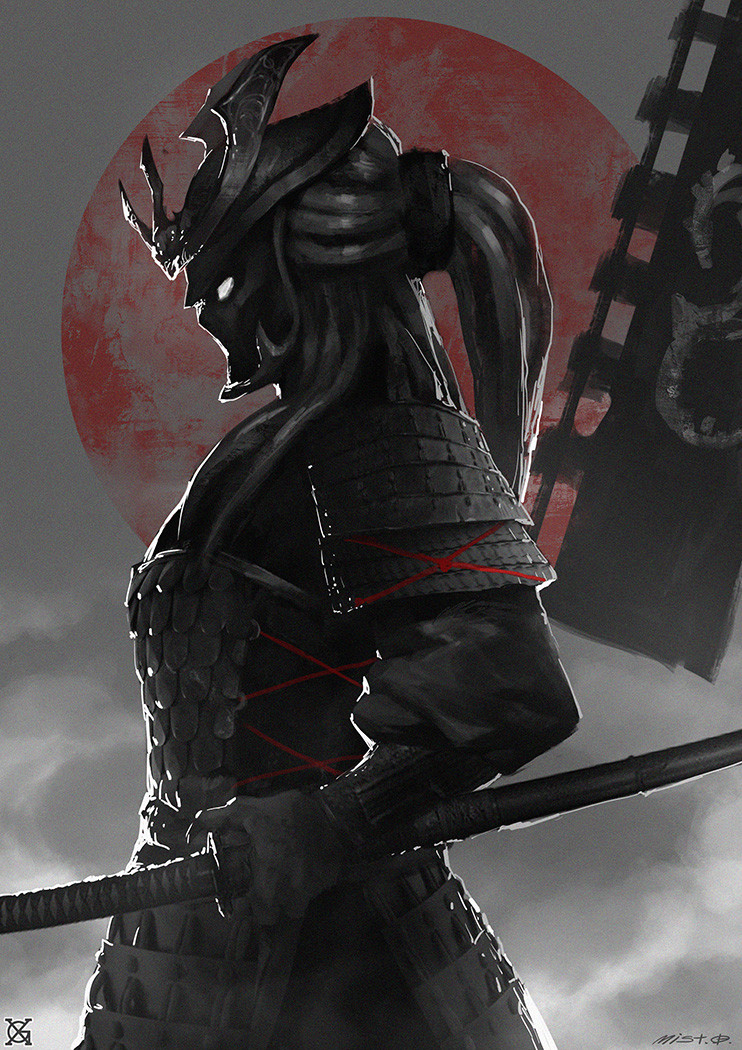
































Way of the Ninja
Monks of the Way of the Ninja rely on their ability to imbue objects of power with their ki. These mystic artisans double as a variety of workman: wizened hard-working craftsman, a humble penmaker, or even a highly spiritual exorcist. Regardless of what they do in the day, when they take to the night, their humble craftmanship complements their deadly skill. Those who are prove themselves to the Way gain access to special equipment and eventually the Vault, a magical repository of legendary items to be used in times of great need.
Ki Craft
You learn ancient techniques to create beautiful objects out of everyday materials. You can make things like smooth clay balls (dorodango), hollow-point darts filled with water, and strips of paper with beautiful calligraphy. You carry these with you hidden under your garments.
You can infuse one of these objects with one ki point and use it. For example, infusing a ball of clay causes cracks to appear on the surface, sizzling with magic. When thrown, the ball bursts, creating a cloud of dust.
- For poison darts, make an attack with a dagger, applying the effect on a hit (as well as damage from the dagger).
- For an action, you throw a bomb a location 20 feet away. The diameter of the bomb's area of effect is equal to the bonus distance granted by unarmed movement.
- For an action, you place a seal, which lasts for a minute, in a space adjacent to you. Make a successful Dexterity (Sleight of Hand) check against any creatures that has line of sight of you, or they know the trap is there. Creatures can only communicate the exact location of a trap if they use an action to point it out, but can't remove it without dispel magic. The trap effects the first creature you choose that enters the area of effect, a 10 feet cube.
| Item | Effect |
|---|---|
| Blood-reversing Dart | The dart deals additional poison damage equal to twice your martial die on a hit, and the target must succeed on a successful Constitution save or be poisoned until they receive magical healing. |
| Ki block Dart | The dart deals additional poison damage equal to twice your martial die on a hit, and the target must succeed on a successful Constitution save or be incapacitated until it next takes damage. |
| Ink dust Bomb | Area is heavily obscured for one minute. |
| Choke dust Bomb | Creatures in area can't breathe, are lightly obscured, and cannot cast spells with verbal component. The Choke dust lasts until the end of your next turn. |
| Snare Seal | The creature's speed drops to zero and they go prone. |
| Shock Seal | The creature must succeed on a dexterity saving throw or take lightning damage equal to four times your martial die, and can’t take reactions until the start of its next turn. |
Ninja's Gear
At 6th level, during your next long rest you will awaken to a set of equipment folded neatly next to you, on top of which there is a scroll, which reads "You have proven your loyalty to the Way. As a sign of good faith, we present you the traditional gear of our clan." Choose two items in the Ninja's Gear table below.
| Item | Effect |
|---|---|
| Boots of the Step | Footsteps don't make any sound |
| Concealed Weapons | You have advantage on sleight of hand checks to hide any objects on your person |
| Hand wraps | You can change the damage of your unarmed strikes to be piercing or slashing damage |
| Cloak of gliding | When falling, you can choose to move 5 feet horizontally for every 10 feet you fall. |
| Grapplehook Launcher | You have advantage on grappling hook related ability checks. |
Mastery of the Simple
At 11th level, you have additional options for your equipment. If a creature fails on the save for your poison dart, you can choose for them to be charmed or frightened of you until the start of your next turn instead of the normal effects.
Creatures who start their turn in your bomb's area of effect need to make a constitution saving throw or be poisoned for Ink dust or incapacitated for Choke dust.
You shroud your traps in ki. You have advantage on your sleight of hand check to place your seals, and true sight, tremorsense, and blindsight do not automatically reveal your traps.
Vault's Tribute
At 17th level, you learn the secrets of accessing the Ninja's Vault, a demiplane inaccessible by mortals except through a closely guarded ritual. You learn this ritual, which takes one minute and 100gp worth of materials. At the end of the ritual one magical item you are attuned to vanishes and gains a place in the Vault.
You can summon any item you tribute to the vault with a bonus action, and can immediately attune to it without taking a short rest first. In addition, you learn of one of the legendary items listed in the Vault’s Repository, and can summon that item as well.
Vault Repository
Bo of Intent
This legendary staff was once wielded by the Monkey King himself. You gain a +3 bonus to attack and damage rolls made with this magic weapon.
While attuned to the staff, you can use a bonus action to manipulate the weapon:
- You can shrink the weapon into a needle
- You can return the weapon to its normal size
- You can enlarge the weapon. It deals an additional 1d6 bludgeoning damage on a hit and gains a reach of 10 feet.
- You can move the weapon up to 30 feet in any direction, but you can't make an attack with it.
Guzzle Gourd
This bright red gourd has several golden rings that restrain its bulging nature.
For an action, you can speak a command word and unstopper the Gourd. A creature you choose within 30 feet vanishes into the gourd and is transported into a demiplane. At the beginning of each of its turns, it must make a DC 40 charisma saving throw or be incapacitated until the start of its next turn and take 1d10 acid damage. Each time the creature fails this save, the save DC decreases by 5.
If the creature makes the save, it can escape from the demiplane using 5 feet of Movement, exiting prone. That creature cannot be affected by this item for one hour.
Tender Nightmare
This elegantly drawn longsword features two edges: one so sharp that taking lives is as effortless as cutting through butterfly wings -- the other somehow even sharper. The creator of the sword attempted to temper the sword's bloody nature through runes infused in the hilt.
This weapon is a Vorpal sword, which counts as a monk weapon for your, and scores a critical hit on a roll of 19 or 20. You gain a +3 bonus to attack and damage rolls made with this magic weapon. Attacks towards anyone you considered an ally when you attuned to this blade automatically miss.
When you use your Flurry of Blows feature, you can instead make a melee weapon attack with this weapon on all targets within reach, rolling separately for each target.
Spear of Endless Winter
This is but a shaft with a tip that emanates an impossible aura of cold - the spear blade itself is made out of the frozen encrusted blood of enemies past.
Once per short rest you can activate the weapon. For the next minute, the weapon gains the properties of a Frost brand and is a monk weapon for you. If you reduce a creature to zero hit points you add its blood to the spear, and deal an additional 20 cold damage on your next attack.
When you use your Flurry of Blows feature, you can instead make a melee weapon attack with this weapon on all targets within a 15-foot cone, rolling separately for each target.


































Way of the Ancient Oak
Monks of the Way of the Ancient Oak are known to be incredibly wise and compassionate people. They only anger when provoked, and prefer non-lethal solutions to problems when possible. Those who are experienced in the ways of the forest can call upon it for gifts - even at times, the gift of life.
Bamboo's Retort
When you reach 3rd level you can use a bonus action to root your body to the ground until the start of your next turn, allowing you to absorb the force of blows and use it against a creature to great effect. If a creature damaged you with a melee attack while you were in your stance, you can make 2 unarmed strikes at that creature (no action required) immediately at the start of your turn.
You are considered to be in this stance whenever you take the Dodge action.
Ancient Oak's Acumen
Also at 3rd level, your meditations in the forest have taught you to recognize the flow of ki through all creatures, regardless of origin. You can direct your attacks towards an enemy's ki points which are imperceptible to other beings and most other monks: You can use Wisdom instead of Dexterity for the Attack and Damage Rolls of your unarmed strikes which do psychic damage.
Tranquil as a Forest
at 6th level, whenever a creature fails their save against your stunning strike feature, you can spend one ki point to have that creature also be subject to the effects of the Sleep spell.
The Undergrowth's Curriculum
At 11th level you gain the following benefits:
- Teachings of the Tick: Your body weight drops to 1/4 its normal value, and if you end your turn on a vertical surface, you don't fall as long as that surface can support your weight.
- Grasshopper's Guidance: You can make a standing long jump or high jump up to 10 feet away.
- Ladybug's Lesson: As an action, spend 1 ki point to cast the spell plant growth without material components. When you choose the immediate benefit, you can also create light foliage easily capable of supporting 1/4 your normal weight up to 60 feet high. When you choose the long-term benefit, you can magically rid the area of disease, infestation, or corruption.
DM Note:
From the Undergrowth Curriculum, you are able to vertically traverse any sparsely forested terrain and any area that has something that could support your (new) weight every 10 or so feet. You are also able to produce this terrain through your plant growth spell.
Gift of the Forest
When you fall in battle your kindness to the forest is returned through their gift to you. As a reaction to being reduced to 0 hit points you can let go your earthly tethers and free your soul from your body. If your body still exists, its crumbles into dust.
A body materializes up to 30 feet away from where you fell, and your soul returns to it, reviving you at 20 hitpoints. You can choose to delay your return for up to one minute. You must complete a short rest before you regain use of this feature.
![]()

Way of the Dynamo
While many monastic traditions favor subtlety, steadiness, or a servant spirit, those already steeped with inner strength know that power begets power. Some follow the Way of the Dynamo to explore the depths of their strength, while others seek to become a force to keep threats at bay. Indeed, when a dynamo sets their might against you, expect to feel the overwhelming nature of their determination; as the earth might break and burst from the erupting volcano.
Might, My Armor
At 3rd level, you've trained to thread minuscule portions of your ki throughout your body, creating a defensive weave. While you are wearing no armor and not wielding a shield, your AC equals 10 + your Constitution modifier + your Dexterity or Wisdom modifier (your choice).
Power, My Weapon
Also at 3rd level, you bring full force to every battle, and will not relent. When you make an unarmed strike with a bonus action, you choose one of the following benefits:
- If you hit a creature that is prone, you score a critical hit unless the creature succeeds a Dexterity saving throw.
- If you attack a creature that you are grappling, the attack is made at advantage.
Determination, My Shield
When you reach 6th level, you do not fear attack, but meet it with a resolve as sharp as steel. When you are hit by a melee weapon attack, you can use your reaction to turn the strike into an opportunity. When you do so, the damage you take from the attack is reduced by an amount equal to your Strength modifier (minimum 1) plus the result of rolling the martial arts die indicated for your level.
If you reduce the damage to 0, you can spend 1 ki point to catch the attacking creature's weapon in a trapping maneuver. Their attack misses and they are considered grappled by you. This special form of grapple can end early if the creature drops their weapon. Until the grapple ends, the creature can't attack with the trapped weapon.
Resolve, My Wings
At 11th level you learn how to unleash a devastating kicks while airborne. Once a turn when you make a long jump, your next midair unarmed strike pushes the target away from you half the remainder of the distance of the jump on a hit. You can choose to travel with the creature for that distance, or rebound off in a direction that you choose for the same distance.
Strength, Their Ruin
At 17th level you can spend one ki point (no action required) to empower all your unarmed strikes until the end of your turn. Until the end of your turn, any time you hit a creature with an unarmed strike you can attempt to grapple or shove them as part of the attack.

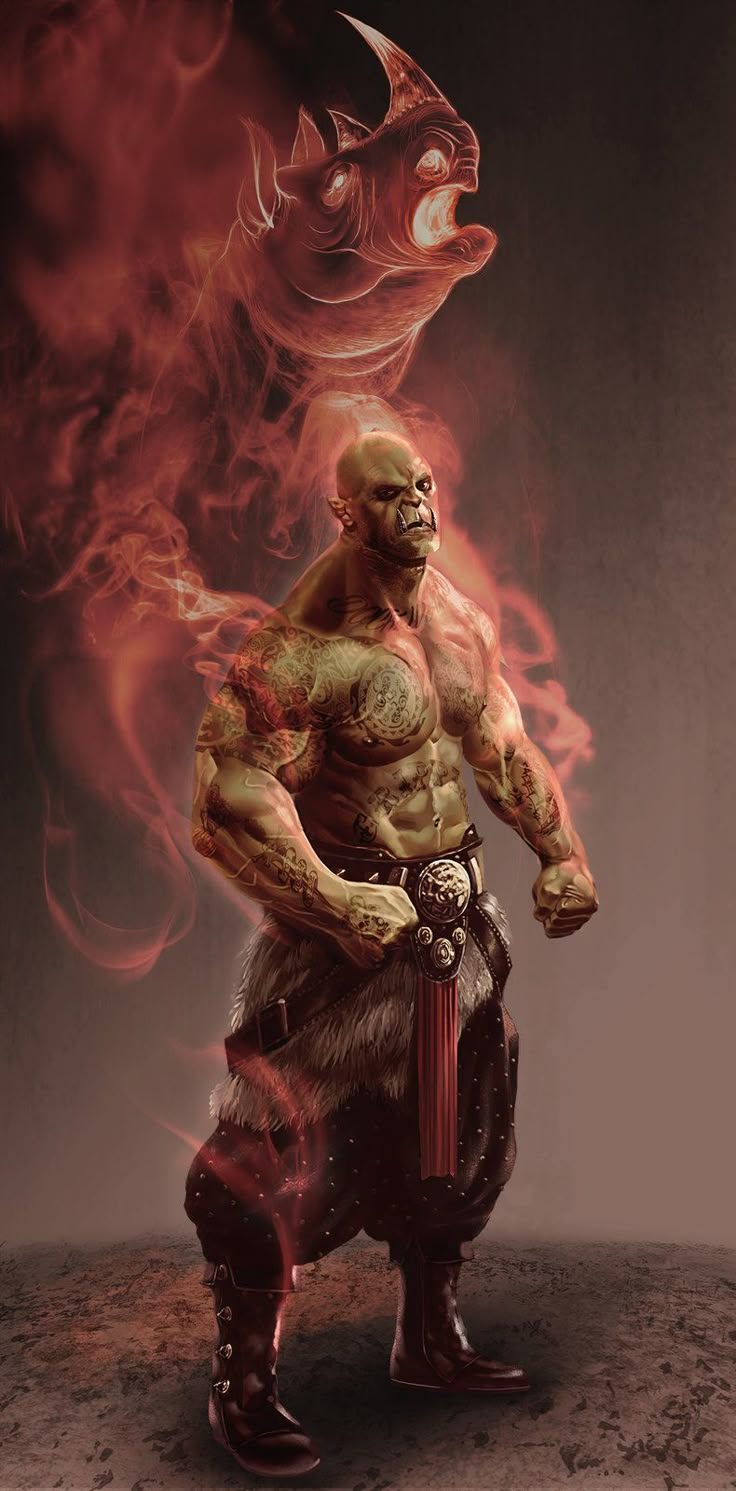
































Way of the Mantra
Way of the Mantra Monks have a powerful affinity to the sacred rites that are lost towards most people. In these scriptures they have found words of power - and use it to dissuade foes and uplift allies. In times of need, they can even utter the forbidden language of the weave, which defines the relationship between magic, ki, the body, and the soul -- and force it into abeyance.
Divine Utterance
At 3rd level when you take the attack action on your turn, you can replace one attack with a divine utterance. A creature you choose within 30 feet of you that can hear you must make a wisdom saving throw or take damage equal to twice your martial die in psychic damage.
You can spend one ki point and a bonus action to imbue your next utterance with a staggering word of power. In addition to making the normal saving throw, that creature must immediately expend its reaction to move 5 feet in a direction you choose, or take 4 times your martial die in psychic damage. If you try to compel it to move in a direction that is obstructed, or if the creature has a speed of zero, it does not take this damage.
Word of the World Weary
At 6th level, you learn how to interject your utterance into a target's mind. You can communicate telepathically with any creature you can see within 30 feet of you.
You can spend 2 ki points to cast healing word, dissonant whispers, enthrall, or command without providing material components. You can cast these spells even if the target can't hear or understand you.
Equilibrium Chants
At 11th level, for an action, you can start a chant for 2 ki points that lasts for 1 minute or until you lose concentration as if you were concentrating on a spell. Choose two targets when you start this chant, one for each chant.
- Yin: Each turn, a willing creature gets either temporary hit points equal to your wisdom modifier or is under the effects of the Bless spell (you choose).
- Yang: Each turn, the creature takes damage equal to your wisdom modifier at the start of its turn, or is under the effects of the Bane spell (you choose).
Embrace Serenity
Ah 17th level you emit an aura of serenity and your utterances fill your allies with determination. Whenever damage reduces a creature within 30 feet of you to 0 hit points, you can spend one ki point for them to instead drop to 1 hit point (no action required). Each time you use this feature after the first, the ki point cost increases by one. When you finish a short or Long Rest, the ki point cost resets to one.


Way of the Golden Needle
Way of the Golden Needle monks are held in highest esteem in monasteries and places of healing and meditation. Their understanding of ki allows them to cure an incredible variety of ailments and creatures - instead of using alchemical or magical solutions, they allow the body to heal itself. However, in times of need, they are a boon to the battlefield, keeping allies up longer and debilitating the enemy.
Combat Acupuncture
When you choose this archetype at 3rd level, you learn how to use acupuncture needles (darts) as weapons as well as medical apparatus. Darts count as monk weapons for you When you use the attack action on your turn to attack with a needle, you can spend 1 ki point to make two additional attacks with one as a bonus action.
You can forgo an attack to apply a needle to a friendly creature within 5 feet. That creature has the option to expend a hit dice to gain temporary hit points equal to your wisdom modifier + their expended hit dice, which last for a minute. Additionally, if you spend one ki point as part of the attack, the target's next roll on a death saving throw before the start of your next turn is treated as a 20.
Healing Chakra
At 6th level, you gain proficiency in the medicine skill. If you are already proficient in it, you gain proficiency in the Herbalism Kit instead. Additionally, you gain the spare the dying cantrip.
You gain understanding of Chakra, or the gates in which ki flows through an individual. When you use one ki point and apply a needle to an ally, you can choose to forgo its normal effect and instead choose a saving throw. The target gains advantage on saving throws of that kind until the end of their next turn.
Golden Needle Technique
At 11th level you learn how to apply the same techniques that you typically use to heal others to block other's Chakra. When you make an attack with a needle, you can spend one ki point to block a chakra. If you hit, choose an ability score. The creature has disadvantage on its next saving throw of that type until the end of their next turn, and disadvantage on ability checks of that type until their next long rest.
You also get better at subtly applying your needles to your enemies. A creature doesn't notice an attack with a needle if you are hidden when you make the attack and you succeed on a Dexterity (Stealth) check contested by their Wisdom (Perception) check.
Release
If you use your Combat Acupuncture feature at least 7 times on one creature within a minute, you can choose for that creature to gain the effects of the revivify spell (no action required). That creature gains one level of exhaustion after the spell takes effect.
If you use your Golden Needle technique and block 6 different chakra on one creature, your next attack at that creature that blocks a Chakra cuts off the soul from the energies that sustain it. Any additional Golden Needle Techniques are no longer effective towards the creature, and the target takes necrotic damage equal to its remaining health.
| Chakra | Effect |
|---|---|
| Root | Dex |
| Sacral | Death |
| Solar Plexus | Strength |
| Heart | Charisma |
| Throat | Constitution |
| Third Eye | Wisdom |
| Crown | Intelligence |


Drunken Master
Way of the Drunken master use an unpredictable stance to throw off opponents. Being consistently off balance requires effort and with the proper technique, allows you to overextend without consequence.
Drunken Fighting Style
At 3rd level, your stumbling gait somehow increases your combat prowess, if a bit unreliably. After any unarmed strike you make using a bonus action you can choose to Stumble. Roll a d8 (your Stumble die) and assign a direction to each number. You move up to 5 feet in that direction if you can, without provoking opportunity attacks.
If you stumble into a large or smaller creature they must succeed on a strength saving throw or are pushed 5 feet back and knocked prone.
Take it or Leave it
Starting at 6th level, when you're targeted by an attack, you can use a reaction and spend 1 ki point to do one of the following options:
- You can immediately Stumble, and can go prone at the end of the movement. If the attack no longer can target you (either because you are out of reach, or out of line of sight), it automatically misses.
- You prepare yourself for the blow. The attack has advantage, but if the attack deals less than 1d10 + your Dexterity modifier + your monk level, it deals no damage.
Additionally, you can blind or silence an enemy instead of stunning them when you use your Stunning Strike feature.
Tipsy Sway
At 11th level, you can spend 1 ki point to take one of the following bonus actions:
- You can make one unarmed attack with advantage. You must stumble but can choose which direction you stumble instead of rolling a die, after which you fall prone.
- You can stand up from prone and make an unarmed attack against any number of creatures within 5 feet of you, with a separate attack roll for each target.
Intoxicated Frenzy
At 17th level, when you use your Flurry of Blows, you can make up to three additional attacks with it (up to a total of five attacks), provided that between each Flurry of Blows attack you stumble, and only move by stumbling.
Player and DM note: If the player forgot to declare which number corresponds to which direction, the DM chooses which direction you stumble, which usually should be the worst direction for the PC.


































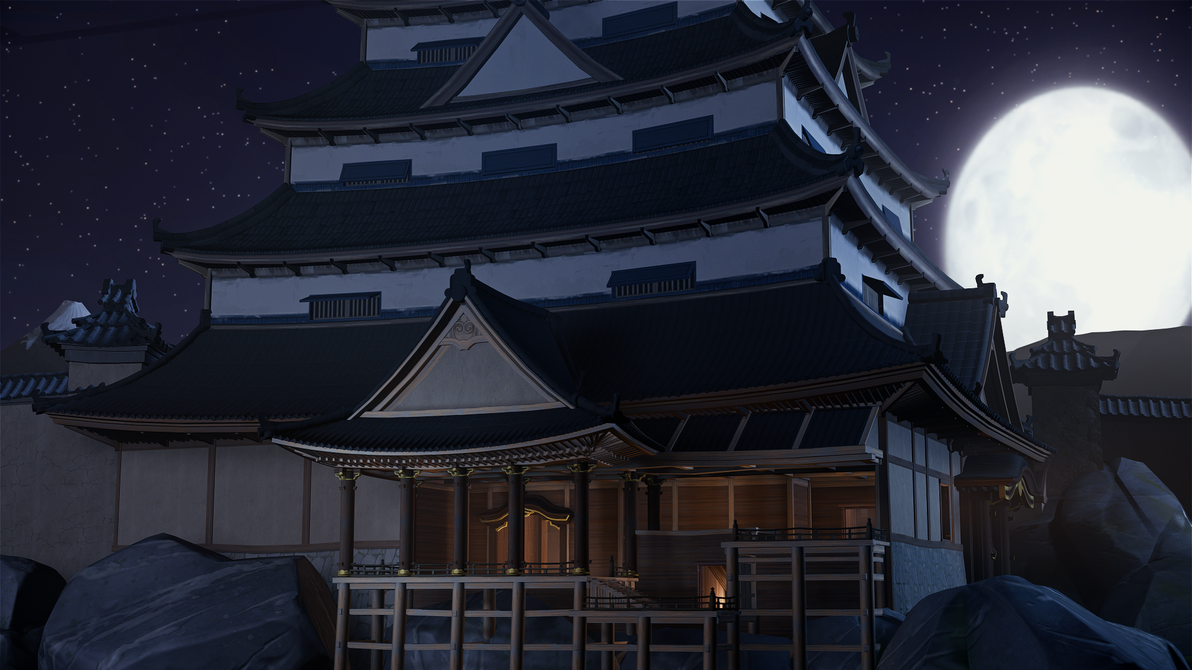


The Temple Assault
You have been tasked to stop the Clasped Cabal, a misled fringe sect from the Monastery of the Whole from enacting a long-lost ritual. The ritual is to strengthen a warrior - normally used to empower a chosen warrior before a crucial conflict. The empowerment causes gradual madness, so the owner of the tattoo traditionally commits ritual suicide before they go insane.
A recent development revealed the perfect opportunity to spring a trap. After setting a subtle ambush, you've tailed a heretic to their hidden hideout. Your goal is to infiltrate the temple, take out the guards, and fight your way to where the Cabal's leader is attempting the ritual - and put it all to an end.
Starting the adventure:
The cool night air carries the feeling of dread - you have reached the imposing barred wooden door of the Cabal's temple, magically hidden but a moment before. The night sky above you darken as the moon glistens with a sanguine hue. The ritual had begun. No more time.
You and your team don hoods and throw some grappling hooks over the wall. Peeking over, you see several monks patrolling in the patio below. Dianne, your leader, spots a more promising entry point and you clamber on after her.
Over the wall the five of you go. A soft rustle behind you as a startled monk, features hidden in shadow, raises his arms to defend himself. Quick as his reactions were, Dianne was first to act.
Roll Initiative.
Entering the Temple
Before turns go through initiative, have Dianne (lvl 6 monk) make 4 attacks on the monk. Statistically, this is very likely to kill him and gives the group an idea of how much health the monk initiates have (see the next section on statblocks).
Next, describe the scene in front of them. (Map) They are hidden in bushes near the eastern-most part of the Bamboo Steppes section (south-west section). There are a couple of monks on low alert on the steppes above them. Diane turns to them hands them 4 superior healing potions, and says:
You must hurry. I must go and alert the elders that we have found their temple. You must stop the ritual, or at least hinder the cult leader. Fight him if you have to, we will be back soon with reinforcements. Oh, and you'll need these. (4 potions)
Recommended Stealth Rules
- Stealth check is equal to highest passive perception in the NPC group. Your group succeeds if half or more succeed.
- Minor fail: a fail of less than 5, that enemy hears a sound that could be misconstrued as innocuous, or sees a glimpse of movement from the PC with the lowest roll.
- Major fail: a fail of 5 or more, or a fail that includes a natural 1, one of them spots the PC with the lowest roll.
Behavior and Distractions
When an enemy sees a PC, roll 2d4 plus the NPC's wisdom modifier and choose from the table below. If on low alert, roll 3d4 drop highest, and on high alert, drop lowest.
Attacks on a stunned or grappled enemy are audible within 10 feet. A cry for help is audible 30 feet through a wall of 120 feet if there is line of sight. Once an enemy has heard or seen combat, they enter initiative. If you attack someone who isn't in initiative yet, they immediately enter initiative but take a suprise round. Players are aware of the efficacy of their own stealth checks.
Outer Section
This is supposed to feel stealthy, with tension. Enemies here will act similar to guards and will do their best to prevent entry. In addition to the set piece encounters, you can have occasional solo guards. Initiates will try to run and notify the nearest group. Adepts will try and fight.
Have guards oriented facing the main gate. Guards out of view of the main gate should have 2-3 patrol positions where they move back and forth between.
Inner Section
Passing through the barrier between sections grants the benefits of a short rest. You get the benefits of a long rest right before approaching the final boss.
Predesigned Encounter Array
You can build your own encounters using the next section, or use these preselected ones (balanced for a party of 4 lvl 6):
| Encounter name | Location | Composition |
|---|---|---|
| Perimeter Guard | Various | 3x Initiate (any) 1x Adept (Magi) |
| Bow Sisters | Bell Tower | 2x Elite (Bow), 3x Initiate (Brute) |
| Brute Bros | Pergola | 2x Stoneheart. 1x Elite (Magi) |
| Food Fight | Entry Dojo | 2x Adept (Drunk), 1x Elite (Brawler) |
| Training | Cherry Pavilion | 10x Initiate (10 hp + no multiattack) |
| Burning Hall | Inner Pergola | 2x Elite (Fire) |
| Spider Trap | Cherry tower | 2x Adept (Spider) |
| Release the Prisoner | Dojo Dungeon | 1x Tattooed Monk, 1x Adept (needle) |
Guard Behavior
| Roll | Type | Minor fail | Major fail |
|---|---|---|---|
| 3 | Distracted | No reaction | One turn later, does a double take |
| 4 | Afraid | Makes a search check. On a success, he becomes "Paranoid" - either way he tries to run back to the group (he doesn't tell them, or they don't believe him) | Freezes and tries to figure out if you realized he saw you. If you allow him to, he will tell the others. |
| 5 | Reckless | Investigates on his own | Engages immediately while alerting others |
| 6 | Normal | Makes a search check. On a success he notifies other that he is going to take a closer look. | He cries out for backup and joins his group. |
| 7 | Leader | All nearby enemies within line of sight of hidden monk act as if they had minor fail | Sends out a global alarm if possible, making all normal behavior monks Alert. |
| 8-9 | Paranoid | He cries out for backup and joins his group. | Is frightened, alerts nearby enemies. |
| 10-11 | Crafty | Pretends to have seen them despite not being sure | Raises a silent alarm, or pretends not to notice anything but returns to the area with a group |
Monk NPCS and Stat blocks
How to use
For the temple section, we use the monks generated by selecting a base and a template. The template grants the monk flavorful abilities, but does not significantly affect CR.
In any particular set piece or encounter, if you eschew the recommended composition, you can roll for the monks or choose them yourself. We recommend choosing only one or two variations per encounter.
Template monks
We have provided three monk "bases" below, one for a scout, another for a more experienced guard, and lastly an experienced member. Most templates have unarmored defense and unarmored movement, which are listed below and not included in any of the template stat blocks to save space.
Unarmored Defense. While the monk is wearing no armor and wielding no shield, its AC includes its Wisdom modifier and uses its Constitution modifier in place of its Dexterity modifier.
Unarmored Movement. While the monk is wearing no armor and wielding no shield, its walking speed increases by 10 feet (included in its speed).
Initiate (tier 1)
Medium [race], chaotic neutral
- Armor Class 14 (rags)
- Hit Points 21 (6d8-6)
- Speed 30
STR DEX CON INT WIS CHA 10 (0) 16 (+3) 9 (-1) 12 (+1) 12 (+1) 10 (+0)
- Saving Throws Dex +5
- Skills Perception +3
- Senses passive Perception 13
- Languages Common
- Challenge 1 (100 XP)
Actions
Multiattack. The monk makes two unarmed strikes. If both attacks hit, the monk can make an additional unarmed strike.
Unarmed Strike. Melee Weapon Attack: +5 to hit, reach 5 ft., one target. Hit: 5 (1d4 + 3) bludgeoning damage.
Adept (tier 2)
Medium humanoid [race], lawful neutral
- Armor Class 15
- Hit Points 65 (10d8+20)
- Speed 40 ft.
STR DEX CON INT WIS CHA 10 (+0) 16 (+3) 14 (+2) 12 (+1) 14 (+2) 10 (+0)
- Saving Throws Con +5, Wis +5
- Senses passive Perception 12
- Languages Common
- Challenge 2 (450 XP)
Actions
Multiattack. The monk makes two unarmed strikes. If both attacks hit the same target, the target must succeed on a DC 13 Constitution saving throw or be stunned until the end of their next turn.
Unarmed Strike. Melee Weapon Attack: +6 to hit, reach 5 ft., one target. Hit: 6 (1d6 + 3) bludgeoning damage
Elite (tier 3)
Medium humanoid [race], lawful neutral
- Armor Class 17
- Hit Points 85 (13d8+26)
- Speed 40 ft.
STR DEX CON INT WIS CHA 10 (+0) 18 (+4) 15 (+3) 12 (+1) 17 (+3) 10 (+0)
- Senses passive Perception 16
- Languages Common
- Challenge 3 (700 XP)
Actions
Multiattack. The monk makes two unarmed strikes. If both attacks hit the same target, the target must succeed on a DC 15 Constitution saving throw or be stunned until the end of their next turn.
Unarmed Strike. Melee Weapon Attack: +7 to hit, reach 5 ft., one target. Hit: 8 (1d8 + 4) bludgeoning damage
Reactions
Hard Head. End either the stunned or incapacitated condition afflicting this creature and take 10 psychic damage.
Template Variants
A monk gains the Variant features that correspond to its tier and all the tiers below it. For example, an Elite monk gains all of the features listed under its Variant. Features can be additional actions (action), traits (traits), stat block changes (stat), and so on. (multi) refers to effects that alter or add onto the Multiattack feature.
| Monk | Feature name and Description |
|---|---|
| Magi (Constellation) |
(1) Dispelling Fist. (multi) If both unarmed strikes hit, the monk can cast dispel magic on target creature (no action required). (2) Sense presence (action) 1/day, the monk can cast detect thoughts without expending a spell slot. (3) Spellcasting. (trait) Spellcasting. After a hit with a melee attack, the monk can cast a spell or cantrip with a bonus action without requiring any components targeting the attacked creature. The monk is a 5th-level spellcaster. Its spellcasting ability is Wisdom (spell save DC 14, +6 to hit with spell attacks). The monk has the following spells prepared: Cantrips (at will): shocking grasp, true strike 1st level (4 slots): command, charm person, sleep 2nd level (3 slots): crown of madness, levitate, hold person 3rd level (2 slots): bestow curse, vampiric touch |
| Bow (Sure Strike) |
(1) Bow. (attack) Ranged Weapon Attack: +5 to hit, range 120/240 ft., one target. Hit: [2x unarmed strike] piercing damage and the creature is marked until it breaks line of sight of the monk. An Bow attack with this monk attack on a creature that is marked deals an additional 11 (2d10) damage. (2) Make Space (attack) Melee Weapon Attack: +5 to hit, reach 5 ft., one target. Hit: 2 (1d4) bludgeoning damage and the target is pushed back 15 feet. Can be used with Multiattack. (3) Eagle eye (trait) An attack on a creature that hasn't moved in its last turn is at advantage, and crits on a 18-20. |
| Brute (Brute) |
(1) Strength Monk. (trait) The monk's strength is 16, and it can attempt to grapple or shove instead of an unarmed strike. (2) Might (trait) Attacks on grappled creatures are at advantage, and attacks on prone creatures crit if they hit. (3) Catch Blow. (reaction) The monk uses its reaction to reduce the damage of a melee attack by 11 (2d10). If it reduces the damage to 0, it is considered to be grappling the target. This special form of grapple can end early if the creature drops their weapon. Until the grapple ends, the creature can't attack with the trapped weapon. |
| Drunk (Drunken Fist) |
(1) Stumble (trait) After any unarmed strike the monk stumbles. The monk moves 5 feet in a random direction after each unarmed strike, without provoking opportunity attacks. (2) Lucky dodge. (reaction) When the monk is targeted by an attack, it immediately stumbles and can choose to fall prone. (3) Stumbling gait. (trait) If the monk stumbles into a creature’s space, that creature must make succeed on a DC15 Strength save or be pushed 5 feet back and fall prone. |
| Brawler (Brawler) |
(1) Throw Junk. (attack) Ranged Weapon Attack: +5 to hit, range 20/60 ft., one target. Hit: unarmed strike damage, and the target must succeed on a DC15 Strength save or be pushed 5 feet back. (2) Don't Care (trait) If the monk has disadvantage on the attack roll of an unarmed strike, it gains advantage on that attack roll. (3) Knock heads (multiattack) If the monk makes its two attacks on different creatures within 5 feet of each other, and hits both, each creature must succeed on a DC 15 Constitution saving throw or stunned until the end of their next turn. |
| Fire (Blazing Cinders) |
(1) Flame strike. (trait) Unarmed strikes deal an additional 1d4 fire damage. (2) Ignite (multiattack) If both unarmed strikes hit, the target is on fire and takes 7 (2d6) damage at the start of its turn until it or a creature 5 feet of it uses its action to put it out. (3) Spreading flames (trait) The monk's unarmed strikes gain 5 feet of reach. When the monk hits an unarmed strike on a creature that is on fire, it can use a bonus action to spread the fire to a creature within 5 feet of the target. |
| Spider (Runemarked) |
(1) Spellcasting. (trait) Spellcasting. The mage is a 3rd-level spellcaster. Its spellcasting ability is Wisdom (spell save DC 14, +6 to hit with spell attacks). The mage has the following wizard spells prepared: Cantrips (at will): Acid spray, thorn whip 2nd level (3 slots): spider climb, Acid Arrow, Web (2) Palm Sigil. (Multi) The monk casts three cantrips. (3) Garrote (trait) If the monk hits with an unarmed strike at advantage, the monk can use a bonus action to grapple the target (escape DC 13). Until the grapple ends, the target can't breathe or talk, and it has advantage on attack rolls against the target. |
| Needle (Golden Needle) |
(1) Golden Needle (attack) Ranged Weapon Attack: +5 to hit, range 50/100 ft., one target. Hit: unarmed strike damage. Treated as an unarmed strike for purposes of multiattack. (2) Healing (trait) The monk can target an ally with its Golden Needle Attack. Instead of rolling an attack roll, that creature gains 11 (2d10) temporary health. (3) Block Chakra. (trait) A target hit with an attack by this monk has disadvantage on their next saving throw from a hostile creature until the end of their next turn. |
Handcrafted monks
Stoneheart Monk
Medium humanoid (goliath), lawful neutral
- Armor Class 14
- Hit Points 32 (5d8 + 10)
- Speed 40 ft.
STR DEX CON INT WIS CHA 16 (+3) 10 (+0) 15 (+2) 12 (+1) 14 (+2) 10 (+0)
- Skills Athletics +5, Perception +4
- Senses tremorsense 10 ft., passive Perception 14
- Languages Common, Giant
- Challenge 2 (450 XP)
Enlarge (Recharges after a Short or Long Rest). As a bonus action, the monk magically increases in size for 1 minute, along with anything it is wearing or carrying. While enlarged, the monk is Large, doubles its damage dice on Strength-based weapon attacks (included in the attacks), and makes Strength checks and Strength saving throws with advantage. If the monk lacks the room to become Large, it attains the maximum size possible in the space available.
Stoneheart Defense. While the monk is wearing no armor and wielding no shield, its AC includes its Wisdom modifier and uses its Constitution modifier in place of its Dexterity modifier.
Unarmored Movement. While the monk is wearing no armor and wielding no shield, its walking speed increases by 10 feet (included in its speed).
Actions
Multiattack. The monk makes two melee attacks. If both attacks hit a Medium or smaller target, the target must succeed on a DC 13 Constitution saving throw or stunned until the end of their next turn.
Unarmed Strike. Melee Weapon Attack: +5 to hit, reach 5 ft., one target. Hit: 6 (1d6 + 3) bludgeoning damage, or 10 (2d6 + 3) bludgeoning damage while enlarged.
Reactions
Parry. The monk adds 2 to its AC against one melee or ranged weapon attack that would hit it. To do so, the monk must see the attacker.
Tattooed Monk
Medium humanoid (human), lawful neutral
- Armor Class 13
- Hit Points 52 / 52 / 52 (24d8 + 48)
- Speed 20 ft.
STR DEX CON INT WIS CHA 10 (+0) 16 (+3) 15 (+2) 3 (-4) 11 (+0) 6 (-2)
- Skills Athletics +5, Perception +4
- Senses tremorsense 10 ft., passive Perception 14
- Languages Common, Giant
- Challenge 4 (450 XP)
Paragon Fortitude. The monk has multiple pools of hit points, each of which is tracked separately. All damage and healing must be completely applied to only one pool. When a pool is reduced to zero, all ongoing conditions and effects affecting the creature end. Once a pool is reduced to zero, that pool cannot receive any healing until after a long rest. If all hit point pools are reduced to zero, the creature is killed.
Paragon Insanity. The monk may take two additional turns in each round of combat. The creature gains a +15 to initiative for its first turn. Each subsequent turn the creature gains is inserted immediately after any one PC’s turn in the initiative order. For each hit point pool that has been reduced to zero, the creature spends one of its turns per round under the effect of the confusion spell.
Hallucinations. At the end of its turn, the monk is blinded to creature that the monk hit with an attack, until the end of the monk's next turn.
Blurring Speed. This monk's teleportation is considered nonmagical.
Actions
Multiattack. The monk makes two unarmed strikes. If both attacks hit, the target must succeed on a DC 13 Constitution saving throw or stunned until the end of their next turn.
***Alpha Strike (Recharge 5-6)***. The monk teleports up to 25 ft. as many as three times and uses an unarmed strike after each teleport. Roll recharge at the end of each turn.
Unarmed Strike. Melee Weapon Attack: +5 to hit, reach 5 ft., one target. Hit: 6 (1d8 + 3) bludgeoning damage.
Thresh (monk leader)
Medium humanoid (human), lawful neutral
- Armor Class 16
- Hit Points 249 (33d8 + 99)
- Speed 30 ft.
STR DEX CON INT WIS CHA 16 (+3) 18 (+4) 17 (+3) 13 (+1) 14 (+2) 6 (-2)
- Saving Throws Dex+7 Con+6 Wis+5
- Skills Athletics +7, Perception +8, Stealth +8
- Senses darkvision 120 ft., passive Perception 15
- Languages Common
- Challenge 8 (3900 XP) | 3 CR 3 creatures
Insanity. For every 83 hitpoints the monk has missing, it spends one of its Legendary Actions Insane. The monk rolls a d6 to determine what it does for that action. On a 1-3, the creature does nothing. On a 4-5, the monk moves 10 feet in a random direction. On a 6, the monk can act and move normally.
Corrupted Wound. When the monk scores a critical hit, it can choose to forgo the damage to force the target to make a DC 13 Constitution saving throw. If the target fails, they must make death saving throws at the start of each of their turns. They don't gain one hit point on a roll of a 20, and when they would become stable the effect ends.
Death's Door. If all hit point pools are reduced to zero, the monk is dying and starts making death saving throws, but does not fall unconscious. Every time the monk succeeds on a death saving throw, it instead gains 33 temporary hit points.
Nightmare Stalk. Creatures can't see the monk if the monk is in dim light or darkness unless they can see through magical darkvision. The monk can hide while in dim light using a bonus action, or immediately before a Legendary Action as a reaction.
Hallucinations. The monk is blinded to creatures that it hit on its previous turn.
Painful Bargain. At the end of each turn, the monk can choose to take 11 (2d10) psychic damage in order to end one condition that is afflicting it."
Actions:
Multiattack. The monk makes two unarmed strikes. If both attacks hit, the target must succeed on a DC 15 Constitution saving throw or be stunned until the end of their next turn.
Unarmed Strike. Melee Weapon Attack: +7 to hit, reach 5 ft., one target. Hit: 7 (1d6 + 4) bludgeoning damage. If the monk is enlarged, the attack deals 13 (2d8 + 4) bludgeoning damage, and pushes the target back 15 ft.
Enlarge. The monk casts enlarge on himself without components or expending a spell slot.
Succumb to Madness. Until the end of the monk's next turn, the monk has advantage on attacks and saving throws. The monk rolls two 1d4s and selects the higher one when determining the effect of Insanity.
Legendary Actions
Must take 3 Legendary Actions each round, choosing from the options below. Only one Legendary Action can be used at a time, and only at the end of another creature's turn.
Jab. The monk moves up to 10 feet and makes an unarmed strike.
Alpha Strike (Recharge 4-6). The monk teleports up to 25 ft. as many as three times making an unarmed strike after each teleport.
Living Nightmare (Recharge 5-6). Each creature within 30 ft. must succeed on a DC 15 Intelligence saving throw or be under the effects of phantasmal force. The phantasms, which can be seen by every creature that failed the save, deal 2d6 (7) psychic damage on one turn each round. A creature can repeat the saving throw at the end of each of its turns, ending the effect on itself on a success.
Infectious Despair (Recharge 6) Every creature within 300 feet must succeed on a DC15 Charisma saving throw or become frightened of the nearest hostile creature until the end of their next turn.
Environment and Tactics
The room that the boss is in is a high-roofed dojo, with some large ornamental lanterns near the center. There are a pile of tattooing tools and ink next to a stool.
The locus of the tattoo glows brightly and an attack can only be aimed there if the monk cannot move, and scores a critical hit if it hits. If this area is hit with an acupuncture needle loaded with the magical ink, the monk is poisoned. At the start of each turn, it must make a DC10 Constitution saving throw or go to 0 hit points.
Thresh takes his first round by using Enlarge, Alpha Strike to teleport to each of the lanterns and smash them, Living Nightmare to make 4 phantasms, and then hiding.
Ending the Adventure
If you kill Thresh, you win. If you die before reaching him, he is able to complete the ritual unmolested and uses his power to kill off those who opposed him first, and then accomplishes his original goal, whatever it may be. However, unwilling to relinquish his life, the ritual consumes him, leaving him a deranged and evil monster.
If you reach thresh and survive for 4 turns, Diane is able to make her way back and joins you. She can be played as a lvl 6 shadow monk, controlled by a PC whose character has died.
If you reduce thresh to 0 hitpoints but your party wipes, or if you survive 10 rounds, reinforcements come to finish him off. Those who aren't dead by then are stabilized.